- Casablanca (1942)
- Schindler's List (1993)
- All Quiet on the Western Front (1930)
- Lawrence of Arabia (1962)
- The Godfather (1972)
- Ben-Hur (1959)
- On the Waterfront (1954)
- From Here to Eternity (1953)
- Midnight Cowboy (1969)
- Chariots of Fire (1981)
- Rocky (1976)
- The Bridge on the River Kwai (1957)
- Amadeus (1984)
- In the Heat of the Night (1967)
- Dances With Wolves (1990)
- One Flew Over the Cuckoo's Nest (1975)
- Braveheart (1995)
- Platoon (1986)
- The Godfather Part II (1974)
- Unforgiven (1992)
- Rain Man (1988)
- Gone with the Wind (1939)
- Titanic (1997)
- Mutiny on the Bounty (1935)
- Forrest Gump (1994)
- The Life of Emile Zola (1937)
- The Last Emperor (1987)
- The French Connection (1971)
- The Great Ziegfeld (1936)
- Rebecca (1940)
- The Best Years of Our Lives (1946)
- It Happened One Night (1934)
- The Silence of the Lambs (1991)
- Patton (1970)
- Kramer vs. Kramer (1979)
- Marty (1955)
- Terms of Endearment (1983)
- The Deer Hunter (1978)
- Ordinary People (1980)
- Gentleman's Agreement (1947)
- Driving Miss Daisy (1989)
- Mrs. Miniver (1942)
- Grand Hotel (1932)
- All the King's Men (1949)
- The Sound of Music (1965)
- The Broadway Melody (1929)
- American Beauty (1999)
- Gandhi (1982)
- An American in Paris (1951)
- The English Patient (1996)
- The Lost Weekend (1945)
- The Apartment (1960)
- All About Eve (1950)
- Tom Jones (1963)
- West Side Story (1961)
- Out of Africa (1985)
- You Can't Take It with You (1938)
- A Man for All Seasons (1966)
- Wings (1927)
- The Sting (1973)
- Gladiator (2000)
- Annie Hall (1977)
- Oliver! (1968)
- My Fair Lady (1964)
- Gigi (1958)
- The Greatest Show on Earth (1952)
- Shakespeare in Love (1998)
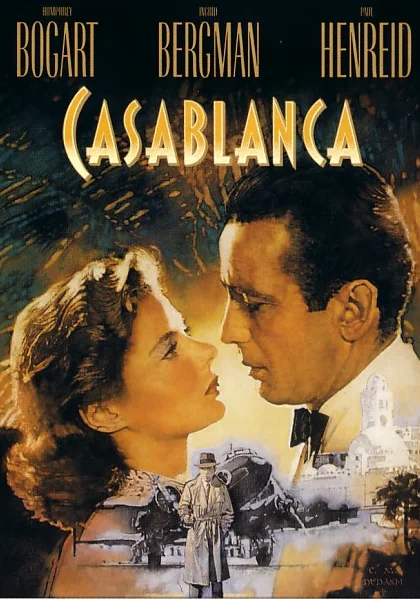 My choice for the number one film of all time is made easy by Casablanca which is the most quotable with
some of the best lines ever written. This one has it all, and it's just perfect, perfect, perfect every step
of the way. Humphrey Bogart, Ingrid Bergman, Claude Rains, and Paul Henreid will always have a place in cinema
history. Movies come and go, but there's only one Casablanca.
My choice for the number one film of all time is made easy by Casablanca which is the most quotable with
some of the best lines ever written. This one has it all, and it's just perfect, perfect, perfect every step
of the way. Humphrey Bogart, Ingrid Bergman, Claude Rains, and Paul Henreid will always have a place in cinema
history. Movies come and go, but there's only one Casablanca.
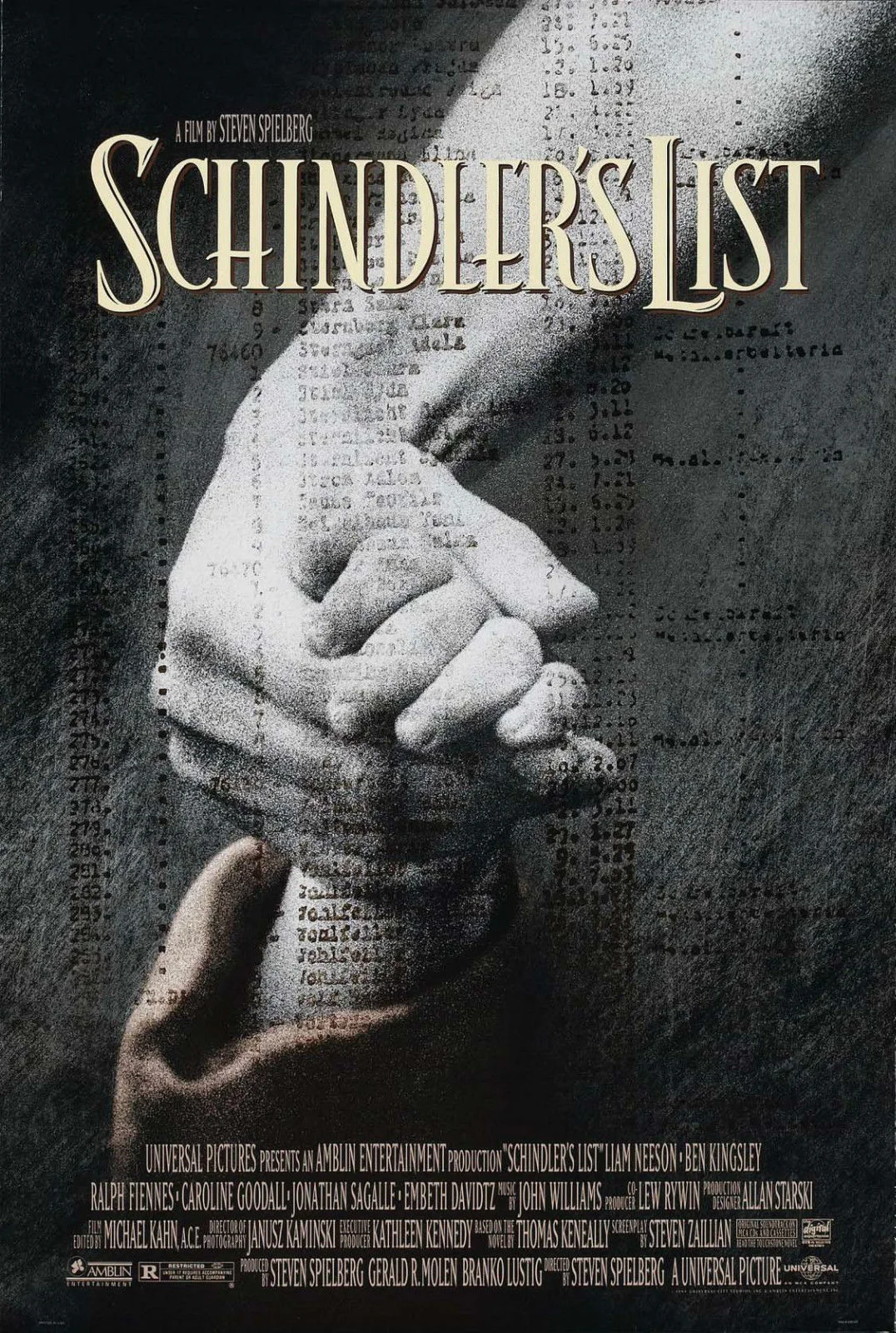 This is the best picture of the decade. It's what I see in books about the Holocaust: Nazi brutality in black
and white. Schindler's List is the stark truth of what happened in German-occupied Europe from 1933 to
1945. There are many powerful scenes that are beyond belief. Steven Spielberg should be praised for the singular
cinematic achievement.
This is the best picture of the decade. It's what I see in books about the Holocaust: Nazi brutality in black
and white. Schindler's List is the stark truth of what happened in German-occupied Europe from 1933 to
1945. There are many powerful scenes that are beyond belief. Steven Spielberg should be praised for the singular
cinematic achievement.
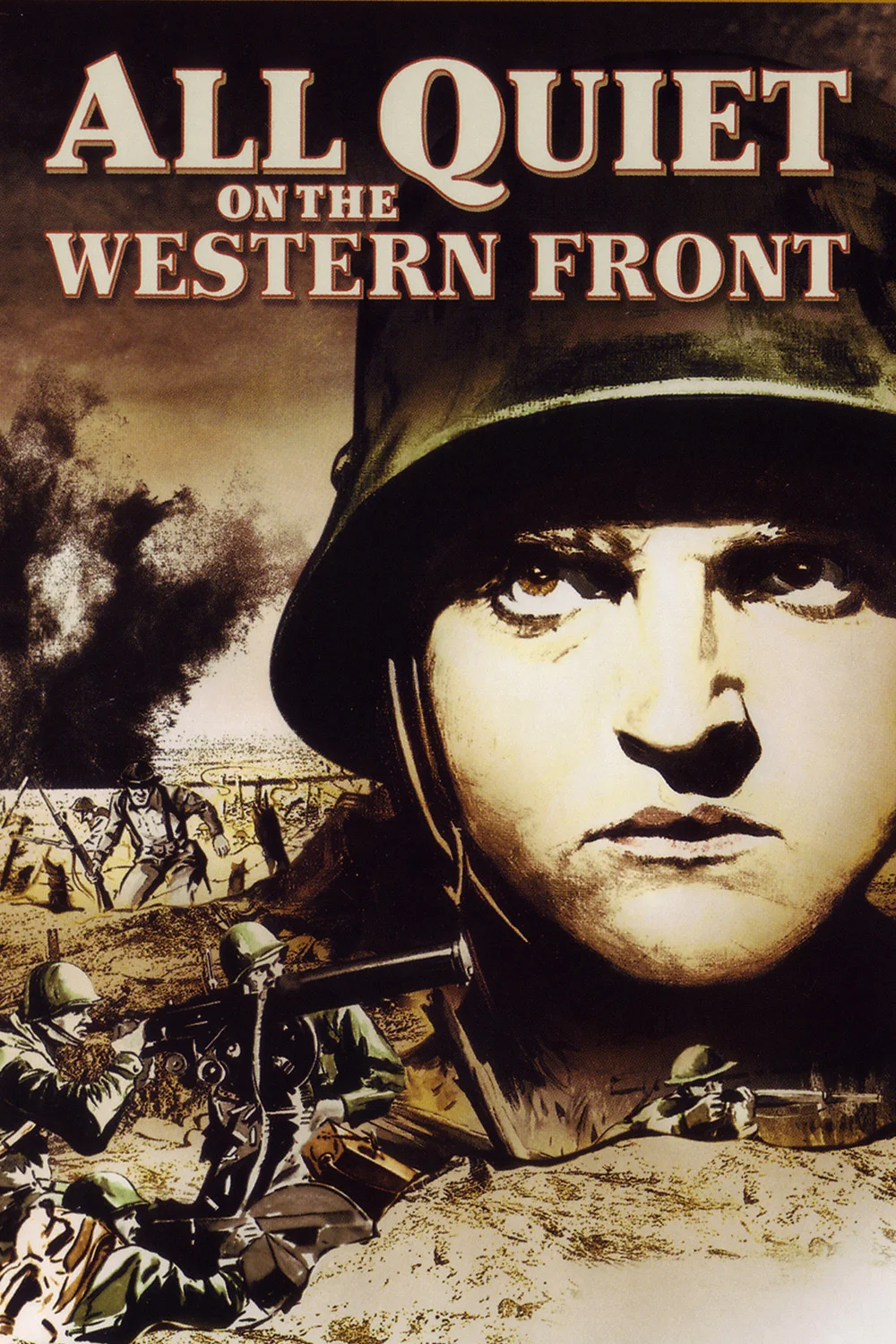 The cinematography is stunning, even by 1920's standards. So many emotions are felt for the characters. It's
understandable as to why the Nazis wanted to burn the book because of its defeating message that war is useless
and trivially pointless. All Quiet on the Western Front carries so much relevance, no matter at what
period of time it's seen in.
The cinematography is stunning, even by 1920's standards. So many emotions are felt for the characters. It's
understandable as to why the Nazis wanted to burn the book because of its defeating message that war is useless
and trivially pointless. All Quiet on the Western Front carries so much relevance, no matter at what
period of time it's seen in.
 A magnificently made masterpiece, it's David Lean's magnum opus. One of the most remarkable jobs he did with his
characters is not only to make them larger than life but also mysterious in terms of their ambitions and
desires. Thanks to Freddie Young's spellbinding cinematography, it's impossible to deny the power of the
desert that Lawrence of Arabia brings to the screen.
A magnificently made masterpiece, it's David Lean's magnum opus. One of the most remarkable jobs he did with his
characters is not only to make them larger than life but also mysterious in terms of their ambitions and
desires. Thanks to Freddie Young's spellbinding cinematography, it's impossible to deny the power of the
desert that Lawrence of Arabia brings to the screen.
 The Godfather is a masterpiece with many big-time actors. There are numerous classic scenes, lines,
and movie moments that make the whole thing unforgettable. Gordon Willis' cinematography is fantastic throughout,
and that's why he has the moniker: Prince of Darkness. Marlon Brando's Don Corleone is the most imitated
character of all time, and it's the beginning of Al Pacino's screen greatness.
The Godfather is a masterpiece with many big-time actors. There are numerous classic scenes, lines,
and movie moments that make the whole thing unforgettable. Gordon Willis' cinematography is fantastic throughout,
and that's why he has the moniker: Prince of Darkness. Marlon Brando's Don Corleone is the most imitated
character of all time, and it's the beginning of Al Pacino's screen greatness.
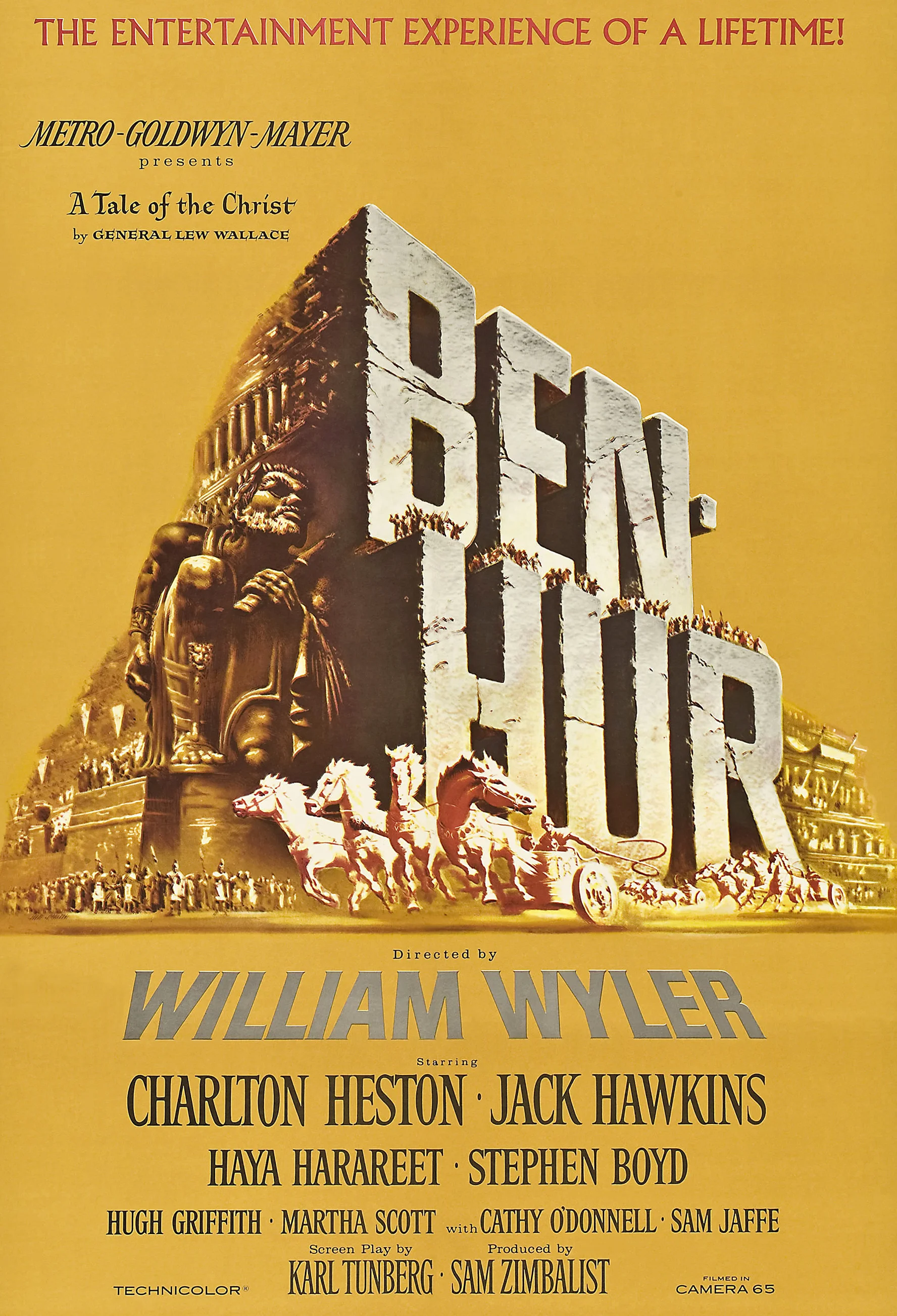 The epic of all epics, it's a big-budget picture amassing over 15,000 extras. Rome has never been so
glorious-looking since the fall of the empire. The greatest and the most breathtaking climax comes during the
chariot race. That scene is the reason alone the epic remains an insurmountable work of cinema. Although it's
the highlight of Ben-Hur, the movie is much more than that which includes the rise of Jesus Christ.
The epic of all epics, it's a big-budget picture amassing over 15,000 extras. Rome has never been so
glorious-looking since the fall of the empire. The greatest and the most breathtaking climax comes during the
chariot race. That scene is the reason alone the epic remains an insurmountable work of cinema. Although it's
the highlight of Ben-Hur, the movie is much more than that which includes the rise of Jesus Christ.
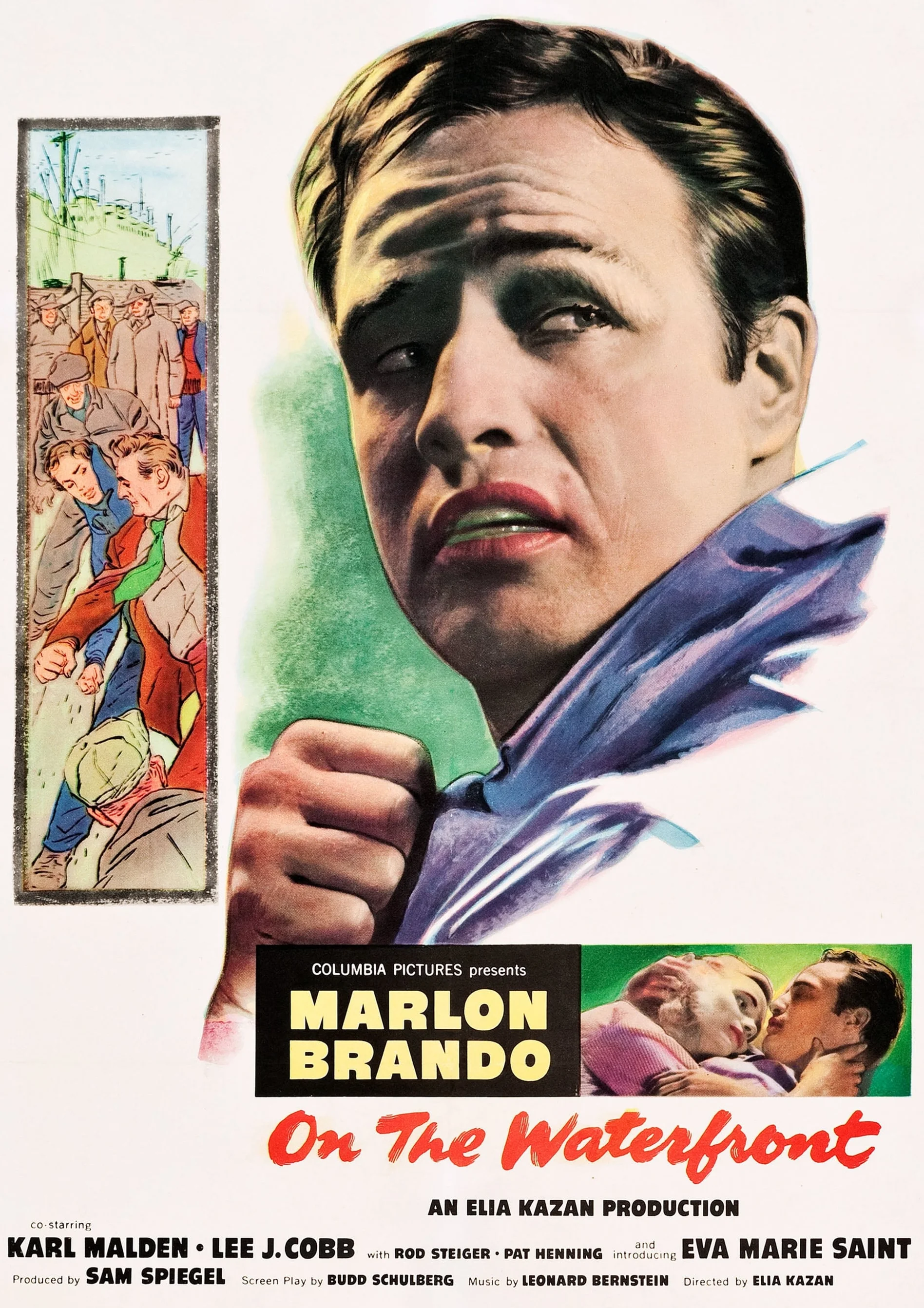 On the Waterfront is one of the most important, influential films made. The best and the greatest ever,
Marlon Brando is spectacular and is in a class of his own. Because of what he did, the landscape of acting had
been forever changed. Whenever I think of timeless movies with great performances, great scenes, and great lines,
On the Waterfront is among them.
On the Waterfront is one of the most important, influential films made. The best and the greatest ever,
Marlon Brando is spectacular and is in a class of his own. Because of what he did, the landscape of acting had
been forever changed. Whenever I think of timeless movies with great performances, great scenes, and great lines,
On the Waterfront is among them.
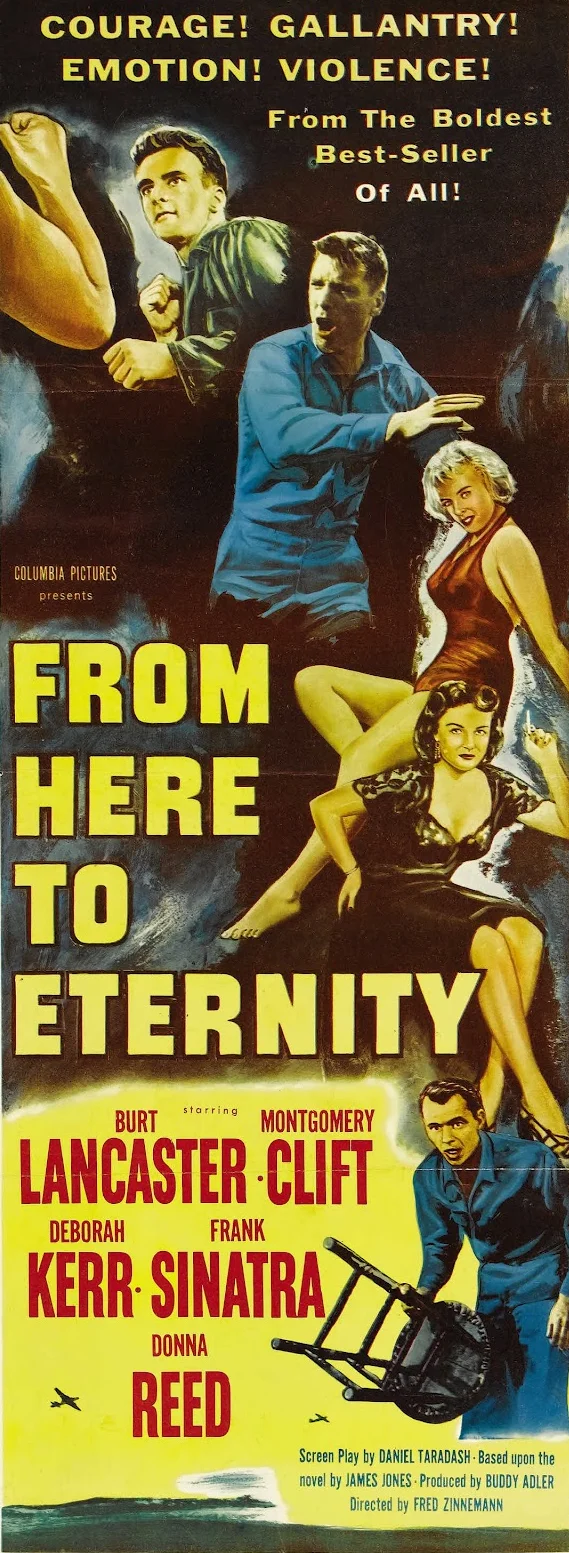 One of the most famous movie scenes of all time is when Burt Lancaster and Deborah Kerr embraced themselves on
the beach while being engulfed by the water. It's simply breathtaking. If that's all anybody can remember about
From Here to Eternity, then so be it. The performances, especially by Montgomery Clift, Burt Lancaster,
and Frank Sinatra, are unforgettable.
One of the most famous movie scenes of all time is when Burt Lancaster and Deborah Kerr embraced themselves on
the beach while being engulfed by the water. It's simply breathtaking. If that's all anybody can remember about
From Here to Eternity, then so be it. The performances, especially by Montgomery Clift, Burt Lancaster,
and Frank Sinatra, are unforgettable.
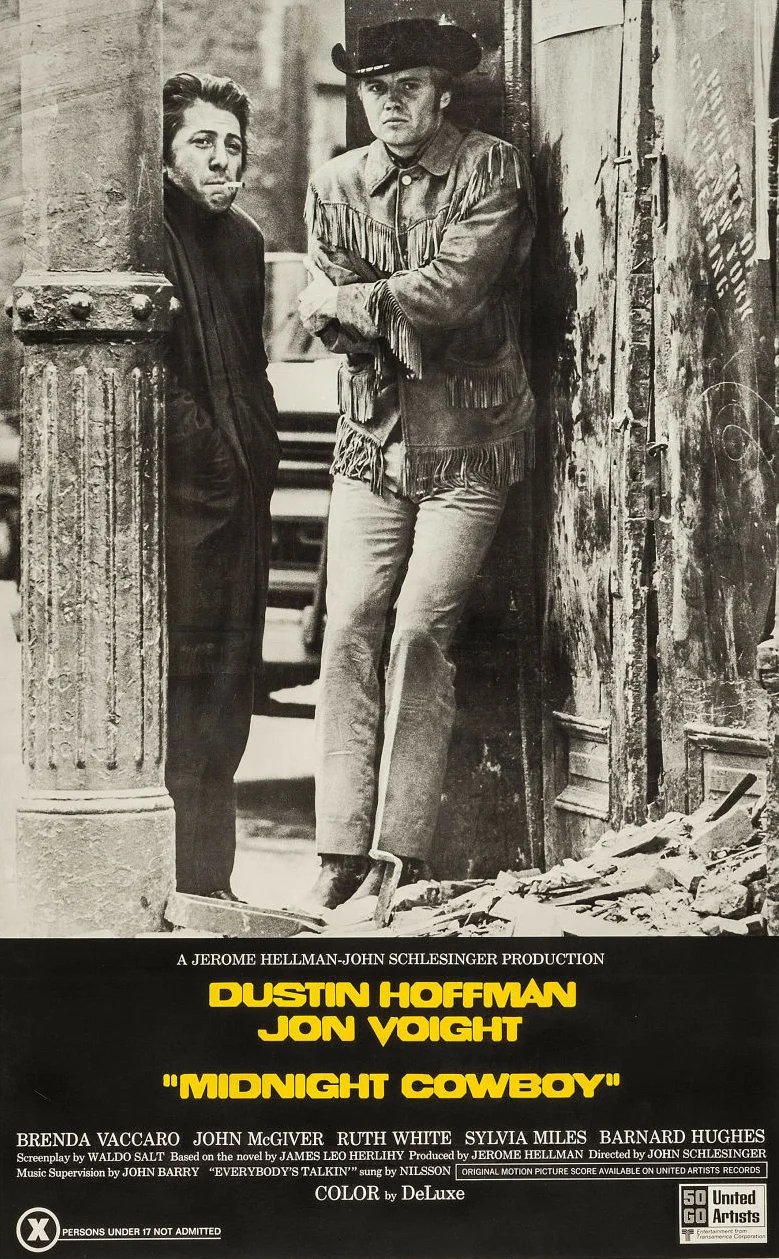 Jon Voight and Dustin Hoffman give the best performances of their careers. They'll be forever remembered for
this film. Midnight Cowboy is a study of human nature: the hopes, the broken dreams, the disillusionment,
the desperation, the suffering, the loneliness, and the loss of innocence. They're all brilliantly read on Jon
Voight's face. The "I'm walkin' here! I'm walkin' here!" scene is priceless.
Jon Voight and Dustin Hoffman give the best performances of their careers. They'll be forever remembered for
this film. Midnight Cowboy is a study of human nature: the hopes, the broken dreams, the disillusionment,
the desperation, the suffering, the loneliness, and the loss of innocence. They're all brilliantly read on Jon
Voight's face. The "I'm walkin' here! I'm walkin' here!" scene is priceless.
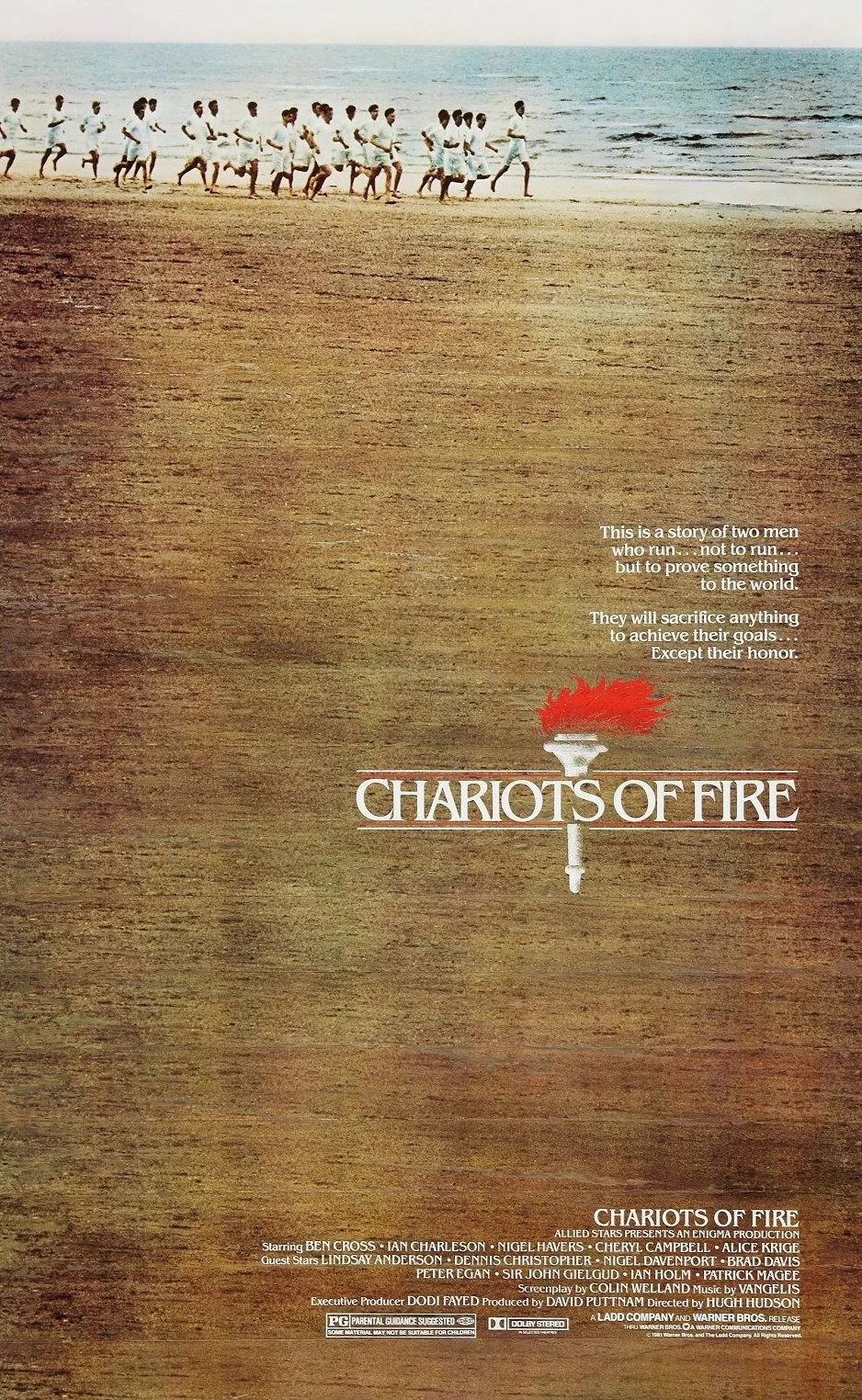 Very few films have the distinction of being described as one of the most beautiful made, and
Chariots of Fire, without doubt, is such that. The opening scene of runners on the beach is absolutely
powerful and represents what the movie is all about: the celebration of human spirit. Honor and virtue are
routinely stressed and backed by actions.
Very few films have the distinction of being described as one of the most beautiful made, and
Chariots of Fire, without doubt, is such that. The opening scene of runners on the beach is absolutely
powerful and represents what the movie is all about: the celebration of human spirit. Honor and virtue are
routinely stressed and backed by actions.
 When people talk about the power of cinema, the best example is Rocky's training montage which is
uplifting, powerful, and unforgettable. Not just an outstanding boxing film, it also has the romance of a
lifetime with an all-time great ending. Terrific acting and direction transcend Rocky into a moving
motion picture for all people.
When people talk about the power of cinema, the best example is Rocky's training montage which is
uplifting, powerful, and unforgettable. Not just an outstanding boxing film, it also has the romance of a
lifetime with an all-time great ending. Terrific acting and direction transcend Rocky into a moving
motion picture for all people.
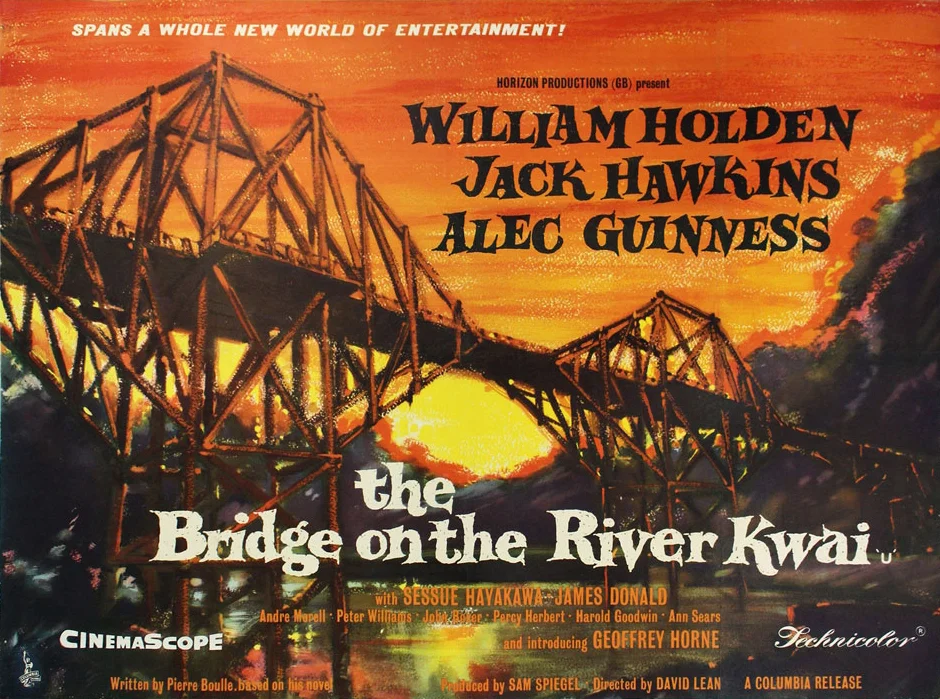 "Madness. Madness!" The exclamation at the end says it all about The Bridge on the River Kwai, a
thrilling WWII picture with William Holden and Alec Guinness at their finest. Against them is the massive
bridge that overshadows everything and therefore must be brought down. However, 12 Angry Men should've
gotten the nod instead.
"Madness. Madness!" The exclamation at the end says it all about The Bridge on the River Kwai, a
thrilling WWII picture with William Holden and Alec Guinness at their finest. Against them is the massive
bridge that overshadows everything and therefore must be brought down. However, 12 Angry Men should've
gotten the nod instead.
 Some have said Amadeus is boring. Some have said Amadeus is too long. And some have said
Amadeus is nothing more than the music. But they all miss out the masterpiece in Amadeus. It's
unbelievable watching F. Murray Abraham and Tom Hulce perform at their absolute best, and they'll be remembered
forever for this film. However, The Killing Fields deserves Best Picture more by a very slight margin.
Some have said Amadeus is boring. Some have said Amadeus is too long. And some have said
Amadeus is nothing more than the music. But they all miss out the masterpiece in Amadeus. It's
unbelievable watching F. Murray Abraham and Tom Hulce perform at their absolute best, and they'll be remembered
forever for this film. However, The Killing Fields deserves Best Picture more by a very slight margin.
 Two acting powerhouses come clashing each other in In the Heat of the Night: Sidney Poitier and Rod
Steiger. As Virgil Tibbs, Sidney Poitier is magical and has two iconic scenes: "They call me MISTER Tibbs!"
and when he slapped Mr. Endicott back. Of the latter, you could hear a pin drop in the middle of the Deep South.
Two acting powerhouses come clashing each other in In the Heat of the Night: Sidney Poitier and Rod
Steiger. As Virgil Tibbs, Sidney Poitier is magical and has two iconic scenes: "They call me MISTER Tibbs!"
and when he slapped Mr. Endicott back. Of the latter, you could hear a pin drop in the middle of the Deep South.
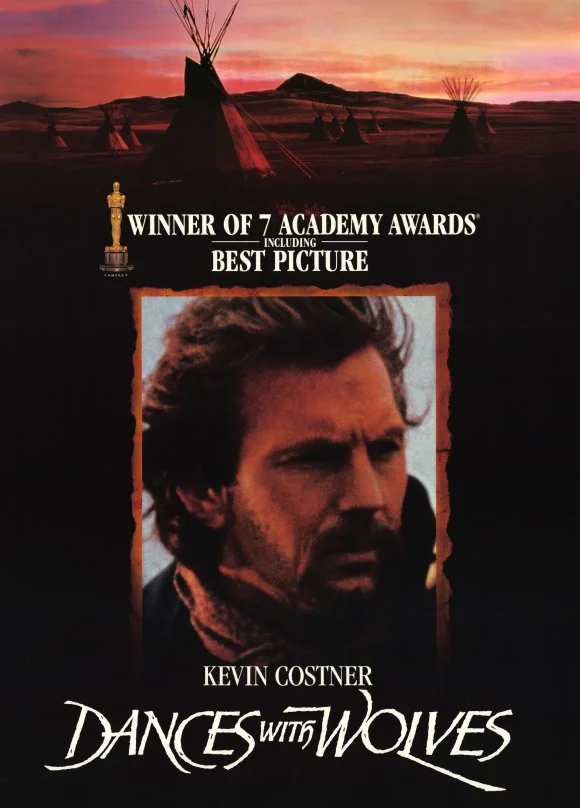 What I love is the simplicity that's left open for translation. Easily the best part is how Dunbar is immersed
into the Sioux culture. Near the end, his fellow soldiers show up. Dunbar takes place among them, but he looks
out of place. Hence, it's the key moment of Dances With Wolves which is about human acceptance without
bias. Not to be missed is the lush cinematography, and the buffalo hunt scene is terrific. Graham Greene and
Rodney A. Grant turn in powerful performances.
What I love is the simplicity that's left open for translation. Easily the best part is how Dunbar is immersed
into the Sioux culture. Near the end, his fellow soldiers show up. Dunbar takes place among them, but he looks
out of place. Hence, it's the key moment of Dances With Wolves which is about human acceptance without
bias. Not to be missed is the lush cinematography, and the buffalo hunt scene is terrific. Graham Greene and
Rodney A. Grant turn in powerful performances.
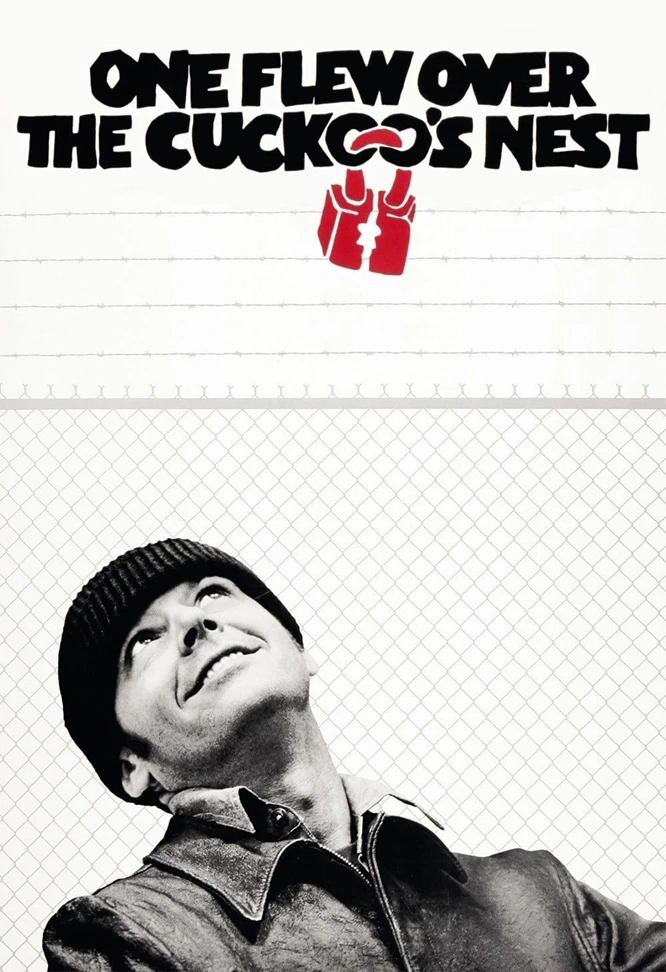 One Flew Over the Cuckoo's Nest is primarily a performance-driven film. There's no doubt that Jack
Nicholson and Louise Fletcher are iconic as Randle McMurphy and Nurse Ratched, respectively. As for the
supporting cast, it's impressive, considering the film was made in 1975. Yet Jaws should've gotten the
Best Picture.
One Flew Over the Cuckoo's Nest is primarily a performance-driven film. There's no doubt that Jack
Nicholson and Louise Fletcher are iconic as Randle McMurphy and Nurse Ratched, respectively. As for the
supporting cast, it's impressive, considering the film was made in 1975. Yet Jaws should've gotten the
Best Picture.
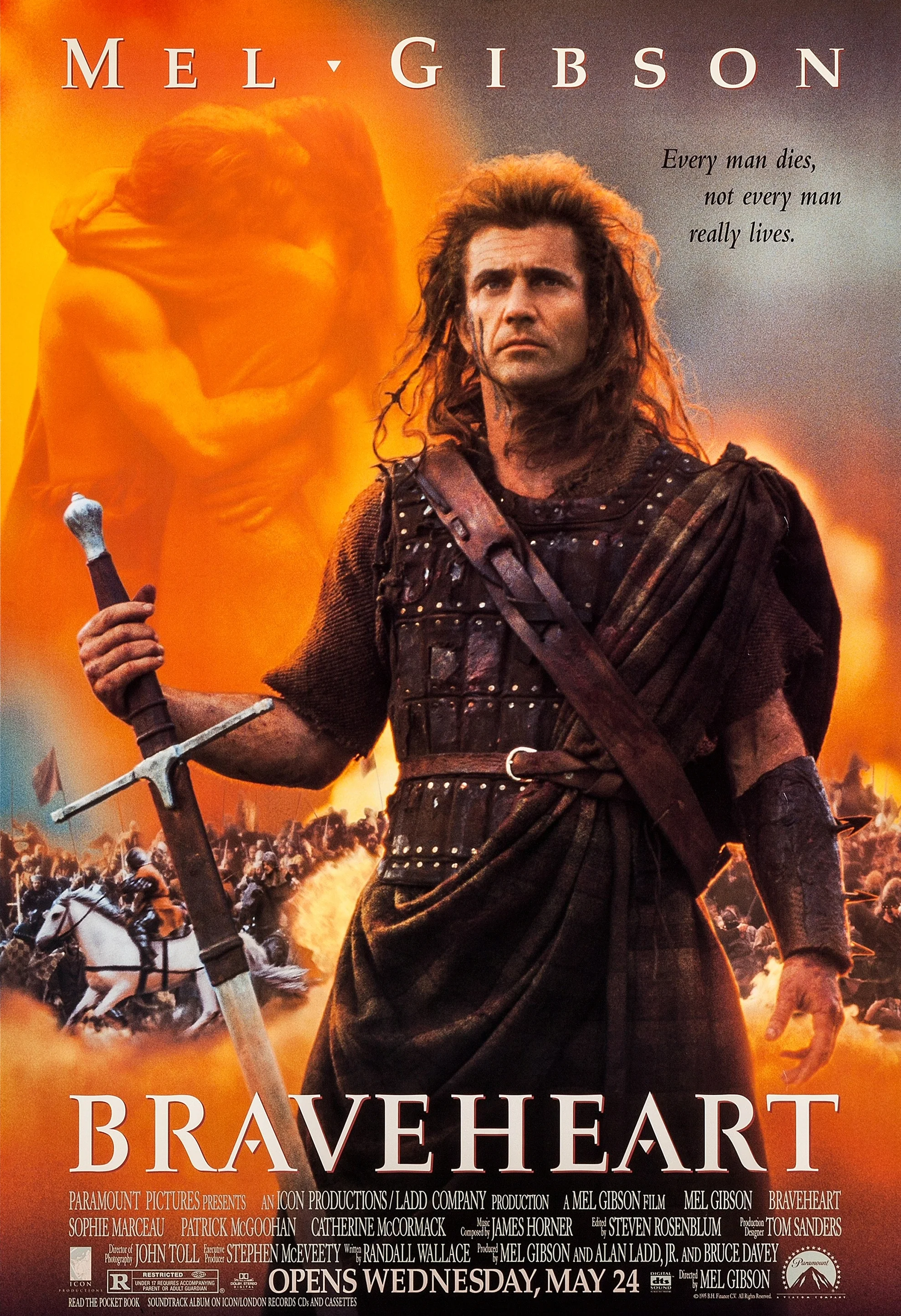 A surprise Oscar winner for Best Picture of 1995, Braveheart is the last great epic war motion picture.
Characters, big, small, clean, dirty, and nameless, all play a large role in scene after scene with so many of
them memorable. Passion is easily felt throughout the wonderful storytelling with a strong script and some of
the most brutal medieval battle scenes ever filmed.
A surprise Oscar winner for Best Picture of 1995, Braveheart is the last great epic war motion picture.
Characters, big, small, clean, dirty, and nameless, all play a large role in scene after scene with so many of
them memorable. Passion is easily felt throughout the wonderful storytelling with a strong script and some of
the most brutal medieval battle scenes ever filmed.
 Platoon is an outstanding Vietnam War picture, depicting the realities of infantry combat. The performances
by the ensemble cast are brilliantly rendered, but it's Tom Berenger and Willem Dafoe who take the film to
another level that makes the whole thing a tragedy. The most thrilling, impactful scene is Elias' death run.
Platoon is an outstanding Vietnam War picture, depicting the realities of infantry combat. The performances
by the ensemble cast are brilliantly rendered, but it's Tom Berenger and Willem Dafoe who take the film to
another level that makes the whole thing a tragedy. The most thrilling, impactful scene is Elias' death run.
 The Godfather Part II picks up where the original left off. Al Pacino continues the rise of Michael
Corleone. Robert De Niro makes things interesting as the young version of Marlon Brando. John Cazale is more
famous in this part than the other one with a classic scene with Al Pacino while Gastone Moschin is excellent
as Don Fanucci. But really, Chinatown was the Best Picture of 1974.
The Godfather Part II picks up where the original left off. Al Pacino continues the rise of Michael
Corleone. Robert De Niro makes things interesting as the young version of Marlon Brando. John Cazale is more
famous in this part than the other one with a classic scene with Al Pacino while Gastone Moschin is excellent
as Don Fanucci. But really, Chinatown was the Best Picture of 1974.
 An ode to a dying genre, Unforgiven is poetic justice to dispel many of the misconceptions that numerous
Western movies had established for so long. What makes it so great is how realistic the ambience feels as the
mood rides heavily on William Munny's mystique. There's a touch of wry humor throughout, and the final climax
is a monster of a ride. However, the true Best Picture winner is The Last of the Mohicans.
An ode to a dying genre, Unforgiven is poetic justice to dispel many of the misconceptions that numerous
Western movies had established for so long. What makes it so great is how realistic the ambience feels as the
mood rides heavily on William Munny's mystique. There's a touch of wry humor throughout, and the final climax
is a monster of a ride. However, the true Best Picture winner is The Last of the Mohicans.
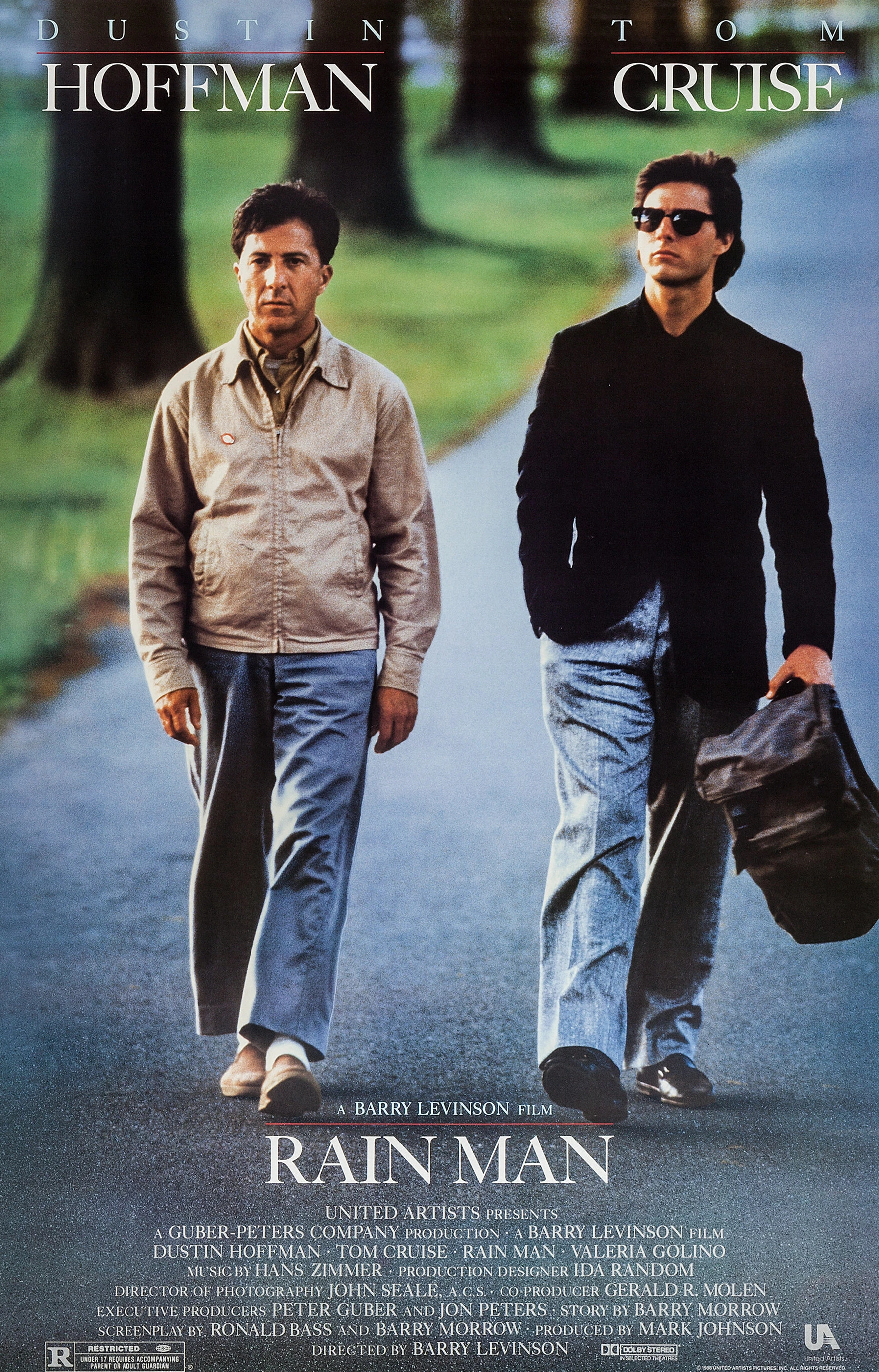 It's an outstanding film with a very strong script that's most likely a variation of John Steinbeck's
Of Mice and Men. At age 27, Tom Cruise was a highly mature actor, showing why nobody in modern cinema
will ever measure up to him. The term "autistic savant" became part of the national lexicon when
Dustin Hoffman introduced it in a big way. But I would've given the Best Picture award to
Dangerous Liaisons.
It's an outstanding film with a very strong script that's most likely a variation of John Steinbeck's
Of Mice and Men. At age 27, Tom Cruise was a highly mature actor, showing why nobody in modern cinema
will ever measure up to him. The term "autistic savant" became part of the national lexicon when
Dustin Hoffman introduced it in a big way. But I would've given the Best Picture award to
Dangerous Liaisons.
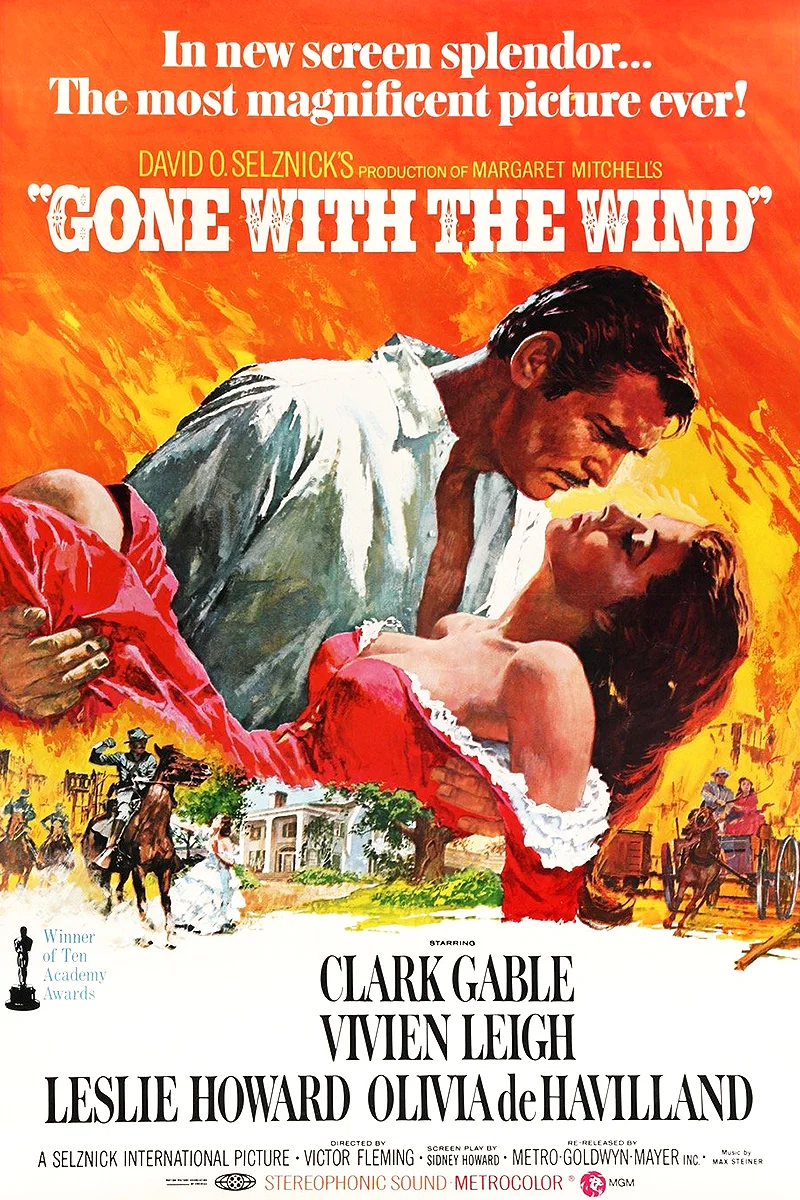 As impressive as it can be, Gone with the Wind is a one-of-a-kind picture although it's an extremely long
epic. Doing an excellent job of perpetuating the myths about the Old South which was anything but, it abounds
with excellent performances, a picturesque cinematography, and a sumptuous story. Vivien Leigh, Clark Gable,
and Olivia de Havilland will always be unforgettable.
As impressive as it can be, Gone with the Wind is a one-of-a-kind picture although it's an extremely long
epic. Doing an excellent job of perpetuating the myths about the Old South which was anything but, it abounds
with excellent performances, a picturesque cinematography, and a sumptuous story. Vivien Leigh, Clark Gable,
and Olivia de Havilland will always be unforgettable.
 Titanic isn't exactly a huge epic picture in the likes of Gone with the Wind,
Lawrence of Arabia, and Ben-Hur, but it's an epic nevertheless. While the romantic aspect is
enjoyable, what's even more impressive is the ship per se. James Cameron is a wunderkind because of how he's able
to blend the visual effects with cinema so effortlessly well that it all looks as one. However,
The Apostle was the best of the year for 1997.
Titanic isn't exactly a huge epic picture in the likes of Gone with the Wind,
Lawrence of Arabia, and Ben-Hur, but it's an epic nevertheless. While the romantic aspect is
enjoyable, what's even more impressive is the ship per se. James Cameron is a wunderkind because of how he's able
to blend the visual effects with cinema so effortlessly well that it all looks as one. However,
The Apostle was the best of the year for 1997.
 Mutiny on the Bounty is an expertly made picture given the year it was filmed in which features a
sweeping story. It's highly watchable because of Clark Gable who steals the show in every scene. And Charles
Laughton is mesmerizing as Captain Bligh. But there was a better film in 1935 and it's called
The 39 Steps by Alfred Hitchcock.
Mutiny on the Bounty is an expertly made picture given the year it was filmed in which features a
sweeping story. It's highly watchable because of Clark Gable who steals the show in every scene. And Charles
Laughton is mesmerizing as Captain Bligh. But there was a better film in 1935 and it's called
The 39 Steps by Alfred Hitchcock.
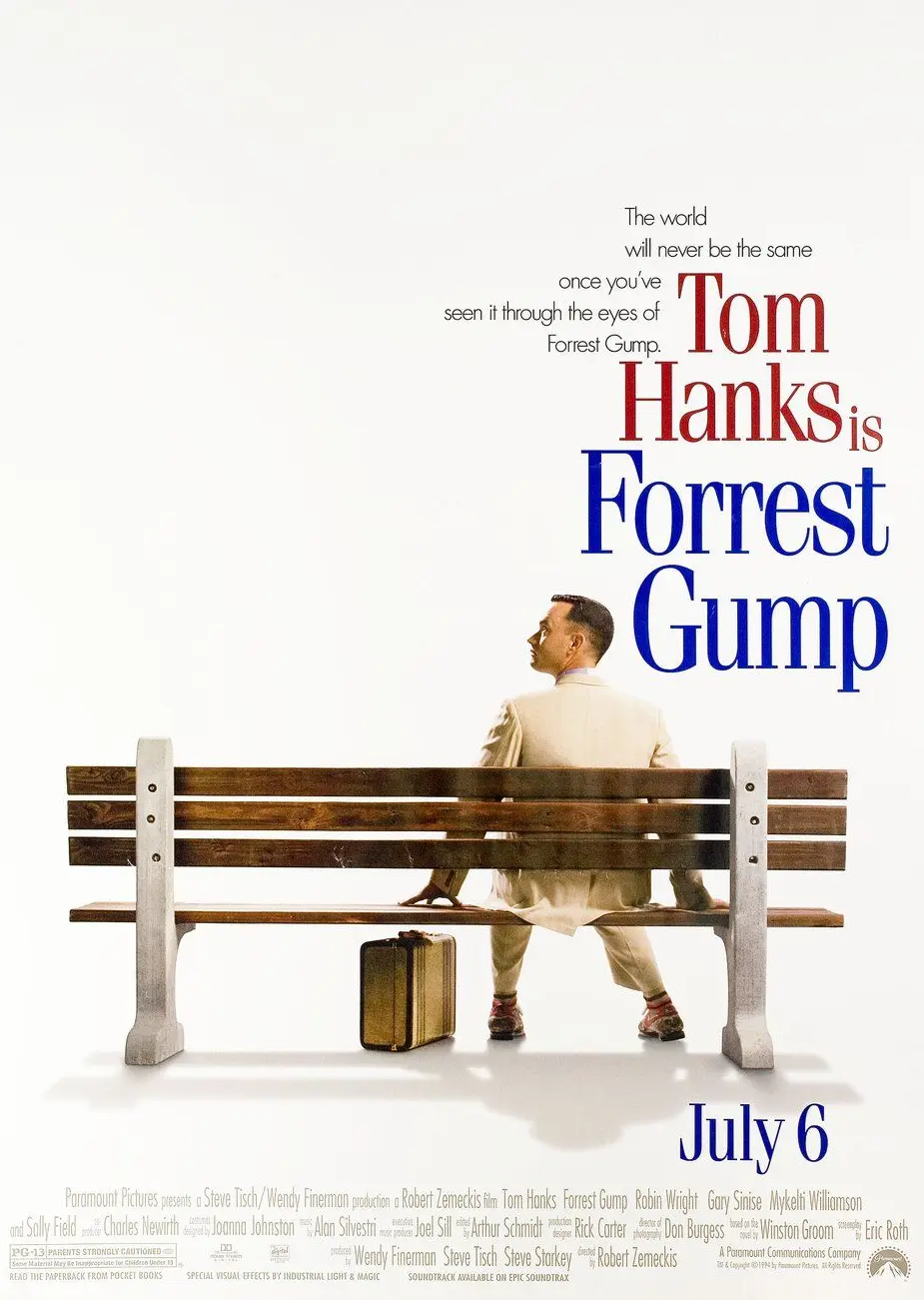 There's no question that Tom Hanks gave an iconic James Stewart-like performance. Many things occur in his
life: the Vietnam War, his chance meetings with Bubba and Lieutenant Dan, the shrimping business, ping pong,
running, and so on. The narration is what makes the movie go quickly, and it's hard to resist the charm of the
whole thing. However, the Academy took a huge hit in credibility when it failed to recognize
The Shawshank Redemption for Best Picture.
There's no question that Tom Hanks gave an iconic James Stewart-like performance. Many things occur in his
life: the Vietnam War, his chance meetings with Bubba and Lieutenant Dan, the shrimping business, ping pong,
running, and so on. The narration is what makes the movie go quickly, and it's hard to resist the charm of the
whole thing. However, the Academy took a huge hit in credibility when it failed to recognize
The Shawshank Redemption for Best Picture.
 The Daniel Day-Lewis of his time, Paul Muni is one of the greatest actors ever lived. He didn't do many films,
starring in only 23 before retiring early due to health problems. When Paul Muni played a character, he became
the character, doing exactly that for The Life of Emile Zola. Naturally so, the story is powerful.
The Daniel Day-Lewis of his time, Paul Muni is one of the greatest actors ever lived. He didn't do many films,
starring in only 23 before retiring early due to health problems. When Paul Muni played a character, he became
the character, doing exactly that for The Life of Emile Zola. Naturally so, the story is powerful.
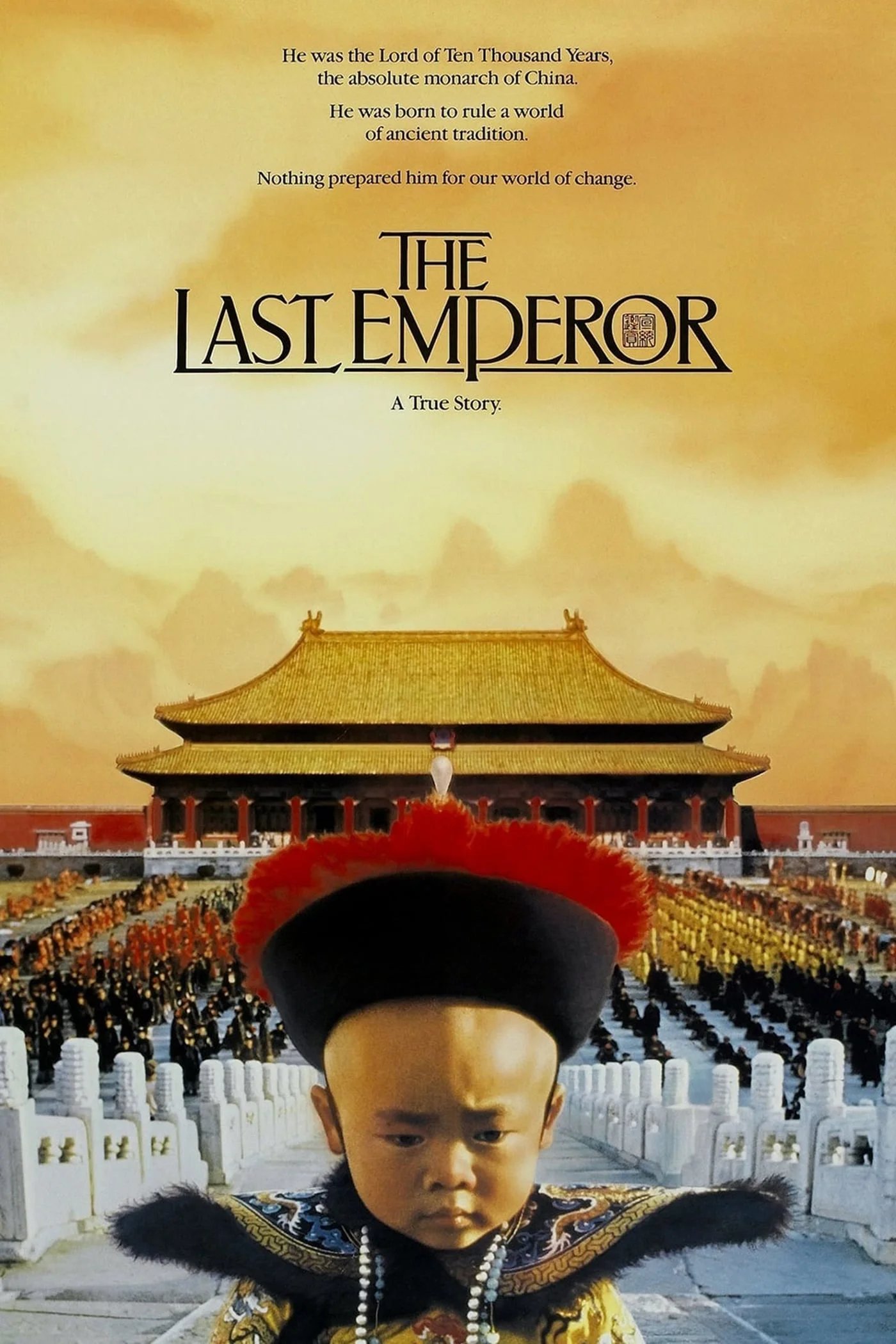 Buoyed by Vittorio Storaro's Oscar-winning cinematography, especially when it comes to inside the Forbidden City,
over 19,000 extras are used to tell a powerful tale of Puyi: how the last emperor of China is crowned at the age
of two years and ten months at an unfortunate timing only to become a common peasant a half-century later.
To tell you the truth, I don't even have this in my top ten for 1987. Therefore, Wall Street is the
number one as it's truly the film of the decade.
Buoyed by Vittorio Storaro's Oscar-winning cinematography, especially when it comes to inside the Forbidden City,
over 19,000 extras are used to tell a powerful tale of Puyi: how the last emperor of China is crowned at the age
of two years and ten months at an unfortunate timing only to become a common peasant a half-century later.
To tell you the truth, I don't even have this in my top ten for 1987. Therefore, Wall Street is the
number one as it's truly the film of the decade.
 Best Picture winner of 1971, The French Connection is one of the most famous cop movies made. Gene
Hackman is unforgettable as Popeye Doyle. A scene that's often imitated in many movies is the dirty car being
taken apart in search of drugs. There's the legendary car chase after the elevated train, and the ending is
chilling to watch. But the Academy made a mistake as the award should've gone to The Last Picture Show.
Best Picture winner of 1971, The French Connection is one of the most famous cop movies made. Gene
Hackman is unforgettable as Popeye Doyle. A scene that's often imitated in many movies is the dirty car being
taken apart in search of drugs. There's the legendary car chase after the elevated train, and the ending is
chilling to watch. But the Academy made a mistake as the award should've gone to The Last Picture Show.
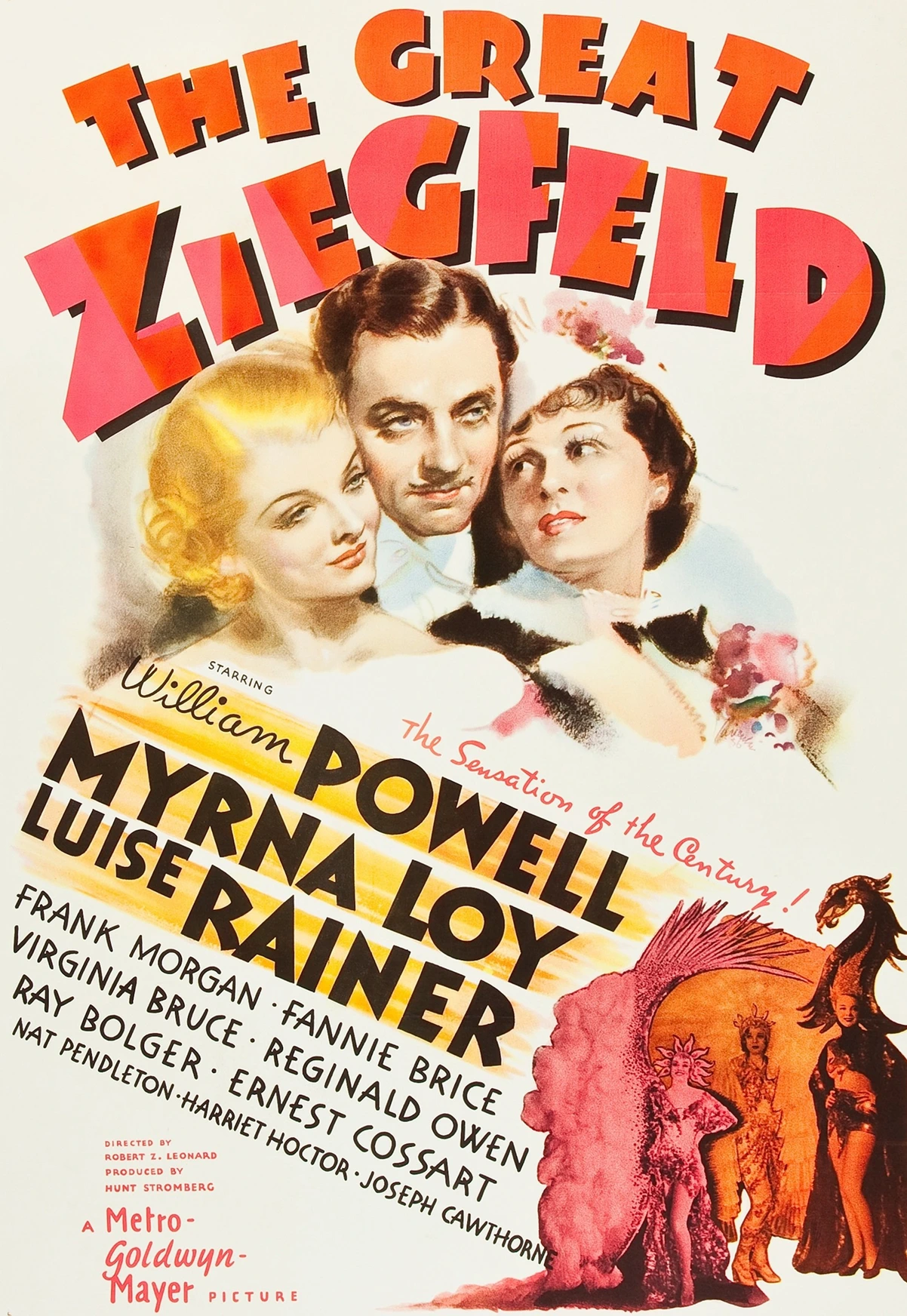 If there's scene that belongs in the top 50 of all time, it's the rotating steps on the stage, reaching seventy
feet high. Breathtaking and magnificent, that may have been the clincher for Best Picture. Today, the musical
represents Classic Hollywood very well. There are other superbly-staged shows that are replicas of the Ziegfeld
Follies that ran on Broadway from 1907 to 1931. Now, you know where the phrase "Ziegfeld Girl" comes from.
If there's scene that belongs in the top 50 of all time, it's the rotating steps on the stage, reaching seventy
feet high. Breathtaking and magnificent, that may have been the clincher for Best Picture. Today, the musical
represents Classic Hollywood very well. There are other superbly-staged shows that are replicas of the Ziegfeld
Follies that ran on Broadway from 1907 to 1931. Now, you know where the phrase "Ziegfeld Girl" comes from.
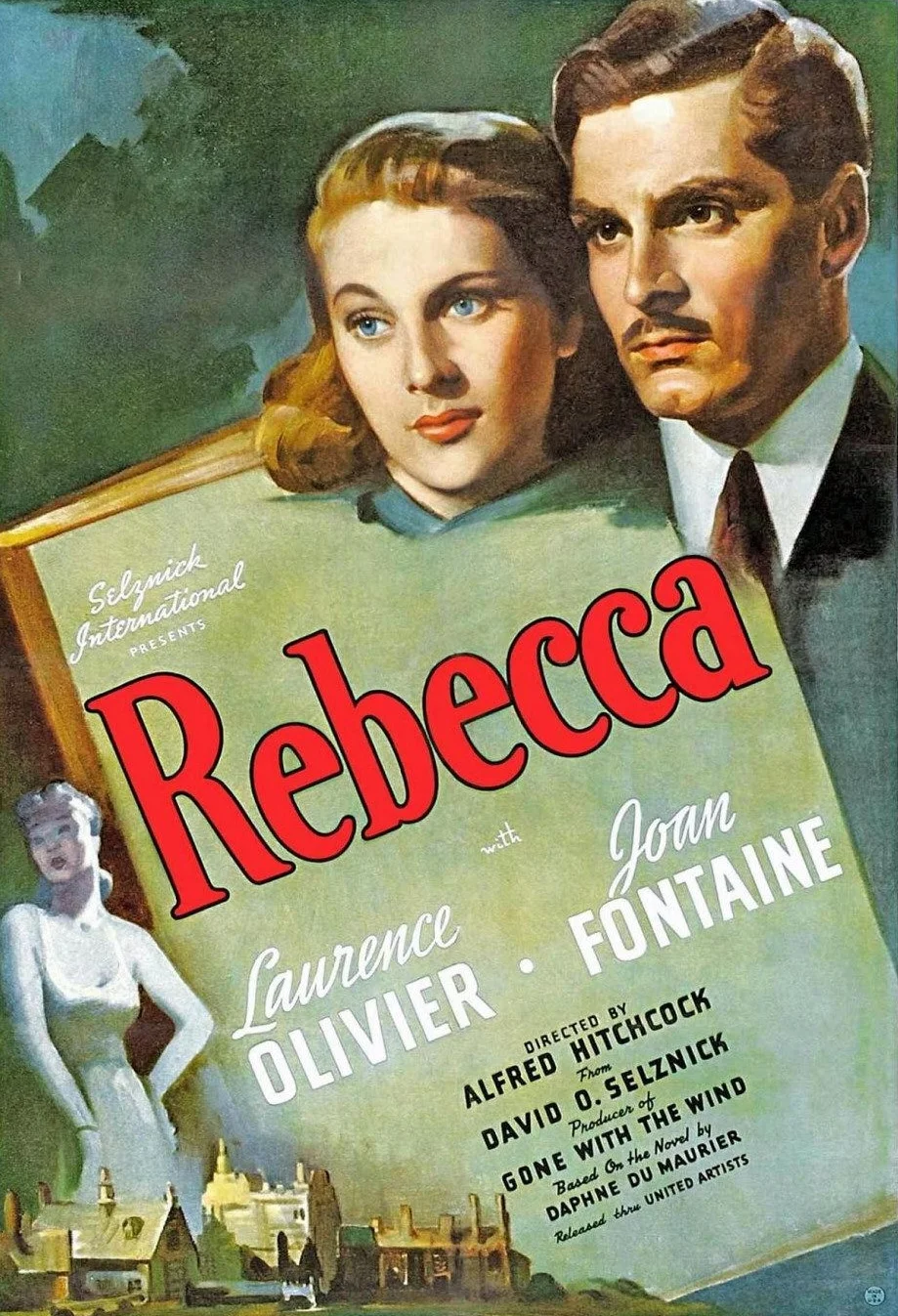 Daphne Du Maurier wrote Rebecca, and Alfred Hitchcock used his technical brilliance to transform the book
into an outstanding picture. The performances by Laurence Olivier and Joan Fontaine are excellent. It's really
she who makes the most of it, envoking suggestions of Ingrid Bergman-Casablanca moments. But
The Grapes of Wrath got robbed big time for Best Picture of 1940.
Daphne Du Maurier wrote Rebecca, and Alfred Hitchcock used his technical brilliance to transform the book
into an outstanding picture. The performances by Laurence Olivier and Joan Fontaine are excellent. It's really
she who makes the most of it, envoking suggestions of Ingrid Bergman-Casablanca moments. But
The Grapes of Wrath got robbed big time for Best Picture of 1940.
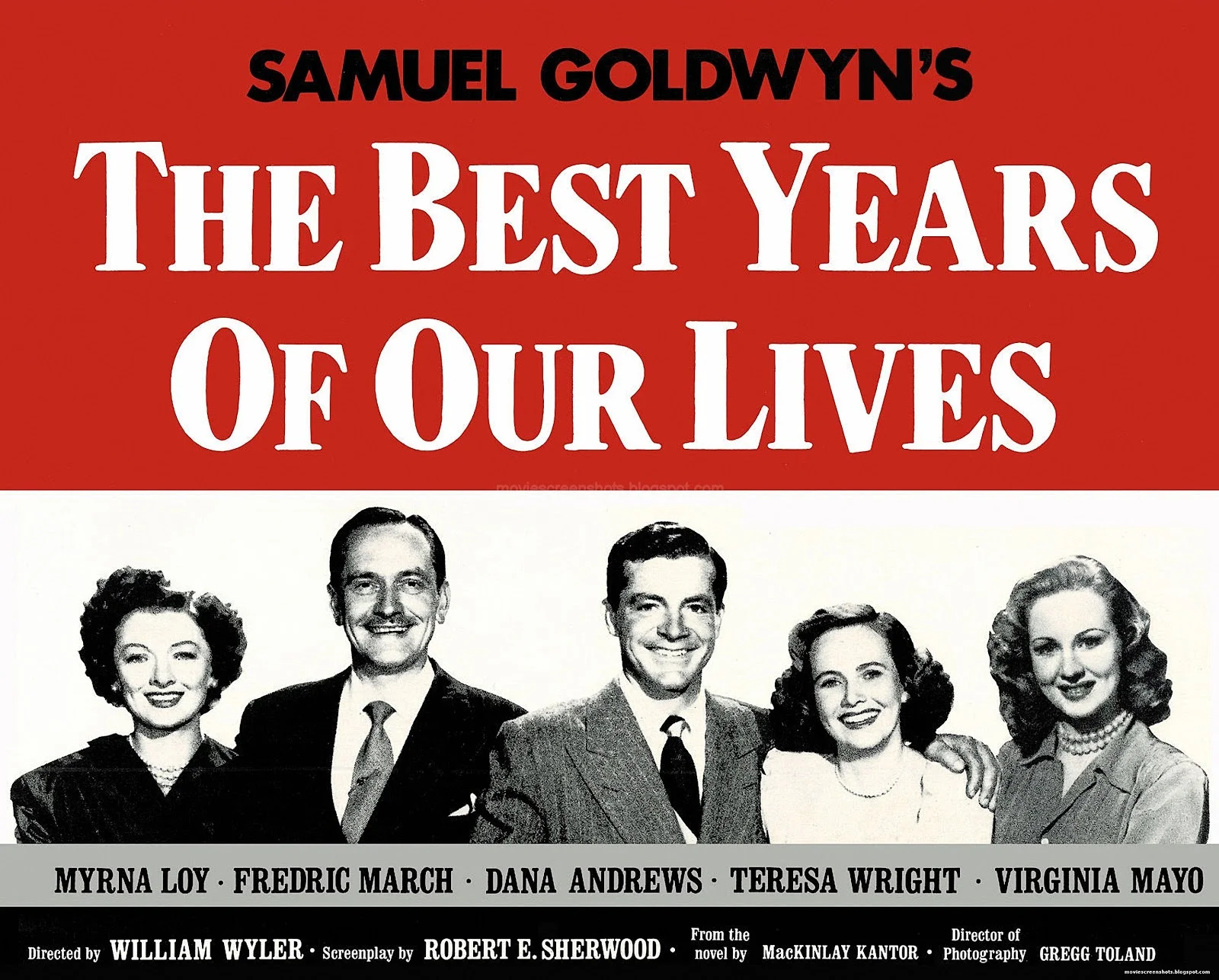 Directed by William Wyler, The Best Years of Our Lives is a moving, albeit long, film about several
returning veterans of WWII. This one is the originator of the genre which is war veterans trying to readjust
to their normal lives. But let's not kid ourselves: It's a Wonderful Life is among the greatest movies
of all time and deserves Best Picture way, way more!
Directed by William Wyler, The Best Years of Our Lives is a moving, albeit long, film about several
returning veterans of WWII. This one is the originator of the genre which is war veterans trying to readjust
to their normal lives. But let's not kid ourselves: It's a Wonderful Life is among the greatest movies
of all time and deserves Best Picture way, way more!
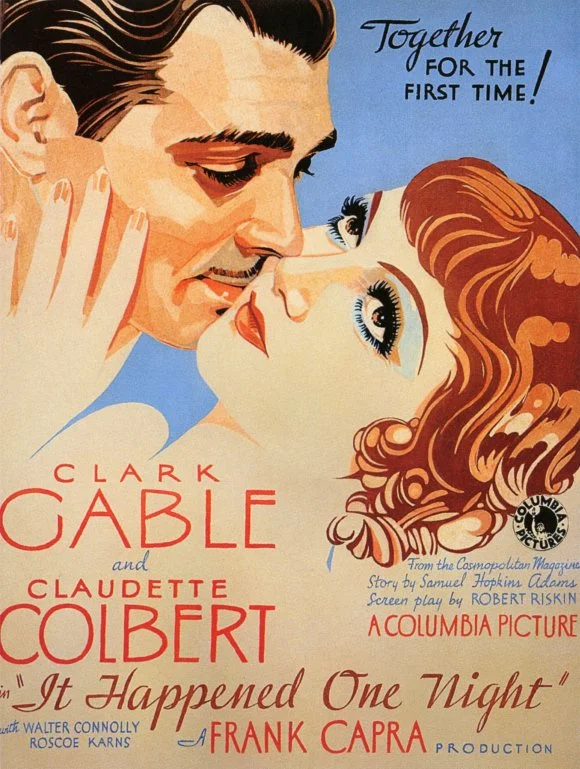 There's a good reason why Clark Gable was given the moniker: King of Hollywood. It's because he was that good
of an actor. It Happened One Night is the film that caused a massive drop in white T-shirt sales when
he was shown undressing without one on. And it would stay that way until Marlon Brando brought it back into
fashion in A Streetcar Named Desire. Honestly, I haven't seen many films from 1934, and so far,
Imitation of Life is my choice.
There's a good reason why Clark Gable was given the moniker: King of Hollywood. It's because he was that good
of an actor. It Happened One Night is the film that caused a massive drop in white T-shirt sales when
he was shown undressing without one on. And it would stay that way until Marlon Brando brought it back into
fashion in A Streetcar Named Desire. Honestly, I haven't seen many films from 1934, and so far,
Imitation of Life is my choice.
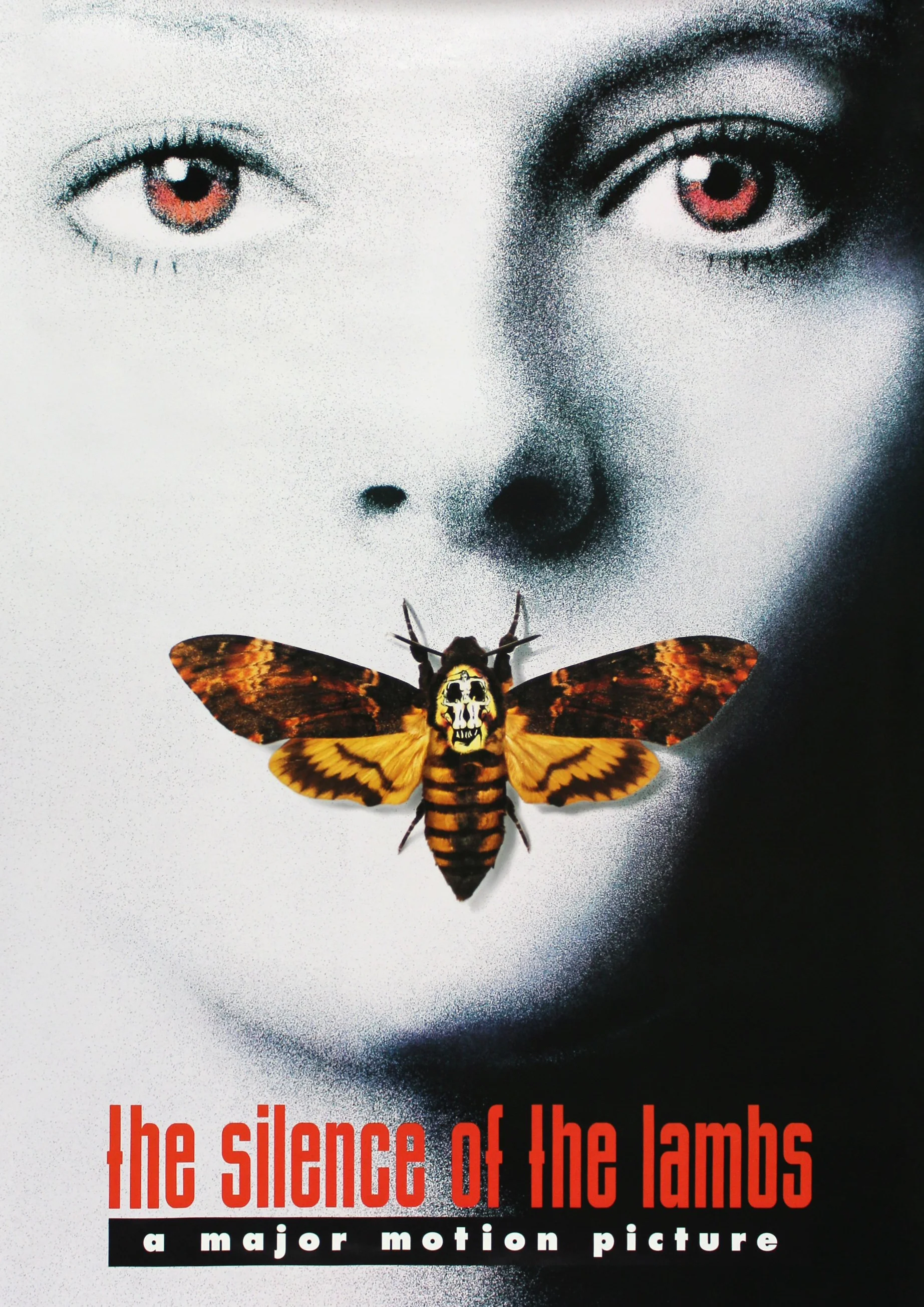 Compared to The Silence of the Lambs, Manhunter is superior in every aspect. Anthony
Hopkins overacts. To this day, people are still apeshit over his character. I have no idea why, but I venture
to guess that it has a lot to do with his fancy half hockey mask. Believe it or not, Anthony Hopkins was unknown
before the film came out, and since then, he's a household name. Jodie Foster is a joke, and it's impossible to
take her seriously. The true Best Picture winner of 1991 is JFK.
Compared to The Silence of the Lambs, Manhunter is superior in every aspect. Anthony
Hopkins overacts. To this day, people are still apeshit over his character. I have no idea why, but I venture
to guess that it has a lot to do with his fancy half hockey mask. Believe it or not, Anthony Hopkins was unknown
before the film came out, and since then, he's a household name. Jodie Foster is a joke, and it's impossible to
take her seriously. The true Best Picture winner of 1991 is JFK.
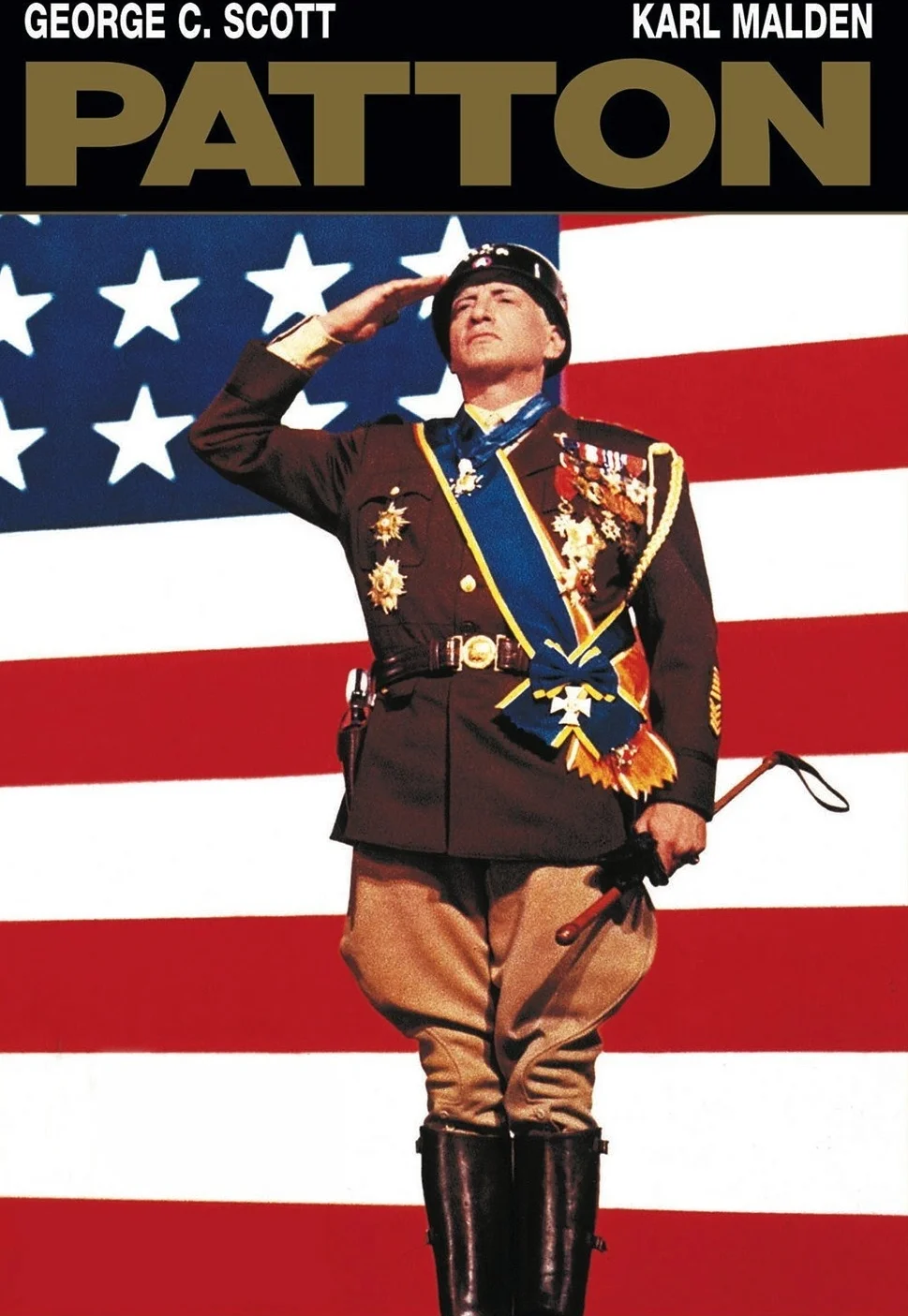 Any biographic sketch of an important yet flawed character is always interesting. And that's the case with General
George S. Patton, the enigmatic gung-ho commander of the United States Seventh Army in the Mediterranean and
European theaters of World War II. It's George C. Scott, winning and then refusing the Oscar for his performance,
who shines the most and proves why he was a remarkable actor of his generation. But that's not equivalent to
Best Picture as it should've gone to M*A*S*H.
Any biographic sketch of an important yet flawed character is always interesting. And that's the case with General
George S. Patton, the enigmatic gung-ho commander of the United States Seventh Army in the Mediterranean and
European theaters of World War II. It's George C. Scott, winning and then refusing the Oscar for his performance,
who shines the most and proves why he was a remarkable actor of his generation. But that's not equivalent to
Best Picture as it should've gone to M*A*S*H.
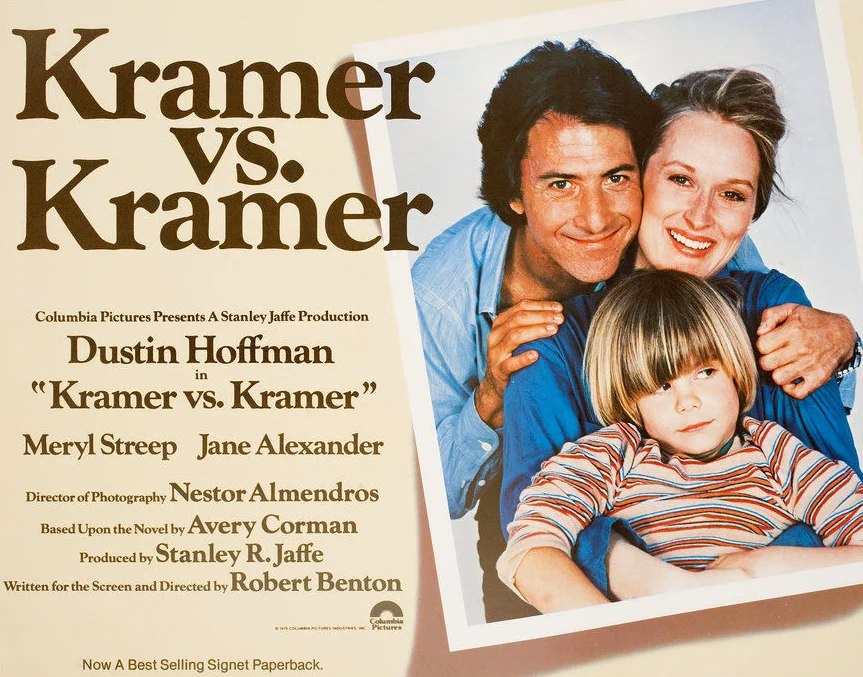 Kramer vs. Kramer is a good film that touches upon an interesting topic in regard to child custody rights.
But...WHO ARE WE KIDDING HERE? The greatest film of 1979 is Apocalypse Now! "You're an errand boy, sent
by grocery clerks, to collect a bill." "You smell that? Do you smell that? Napalm, son. Nothing else in the world
smells like that. I love the smell of napalm in the morning." "The horror...the horror..."
Kramer vs. Kramer is a good film that touches upon an interesting topic in regard to child custody rights.
But...WHO ARE WE KIDDING HERE? The greatest film of 1979 is Apocalypse Now! "You're an errand boy, sent
by grocery clerks, to collect a bill." "You smell that? Do you smell that? Napalm, son. Nothing else in the world
smells like that. I love the smell of napalm in the morning." "The horror...the horror..."
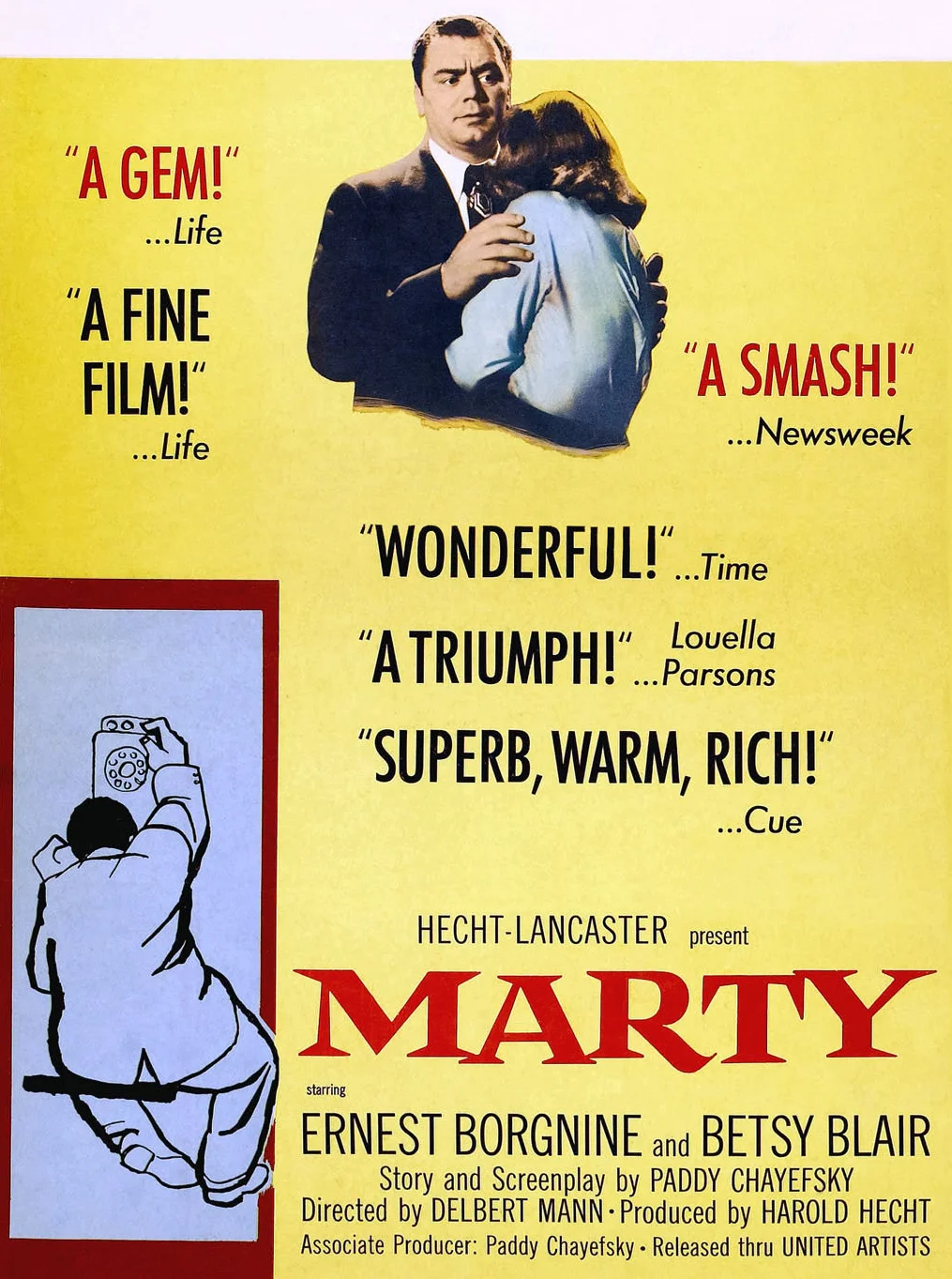 More often than not, I laughed so hard throughout Marty because I found everything about it to be
uproariously hilarious. Here is an insufferable bore who's a fucking pathetic boob, using the "woe is me"
shtick on a loser girl. She falls for him, and everything is all easy peasy. They both have a cry, and the
motormouth just can't stop talking about how his life has been one big goddamn tragedy. All right, let's be
serious: All That Heaven Allows should've won Best Picture.
More often than not, I laughed so hard throughout Marty because I found everything about it to be
uproariously hilarious. Here is an insufferable bore who's a fucking pathetic boob, using the "woe is me"
shtick on a loser girl. She falls for him, and everything is all easy peasy. They both have a cry, and the
motormouth just can't stop talking about how his life has been one big goddamn tragedy. All right, let's be
serious: All That Heaven Allows should've won Best Picture.
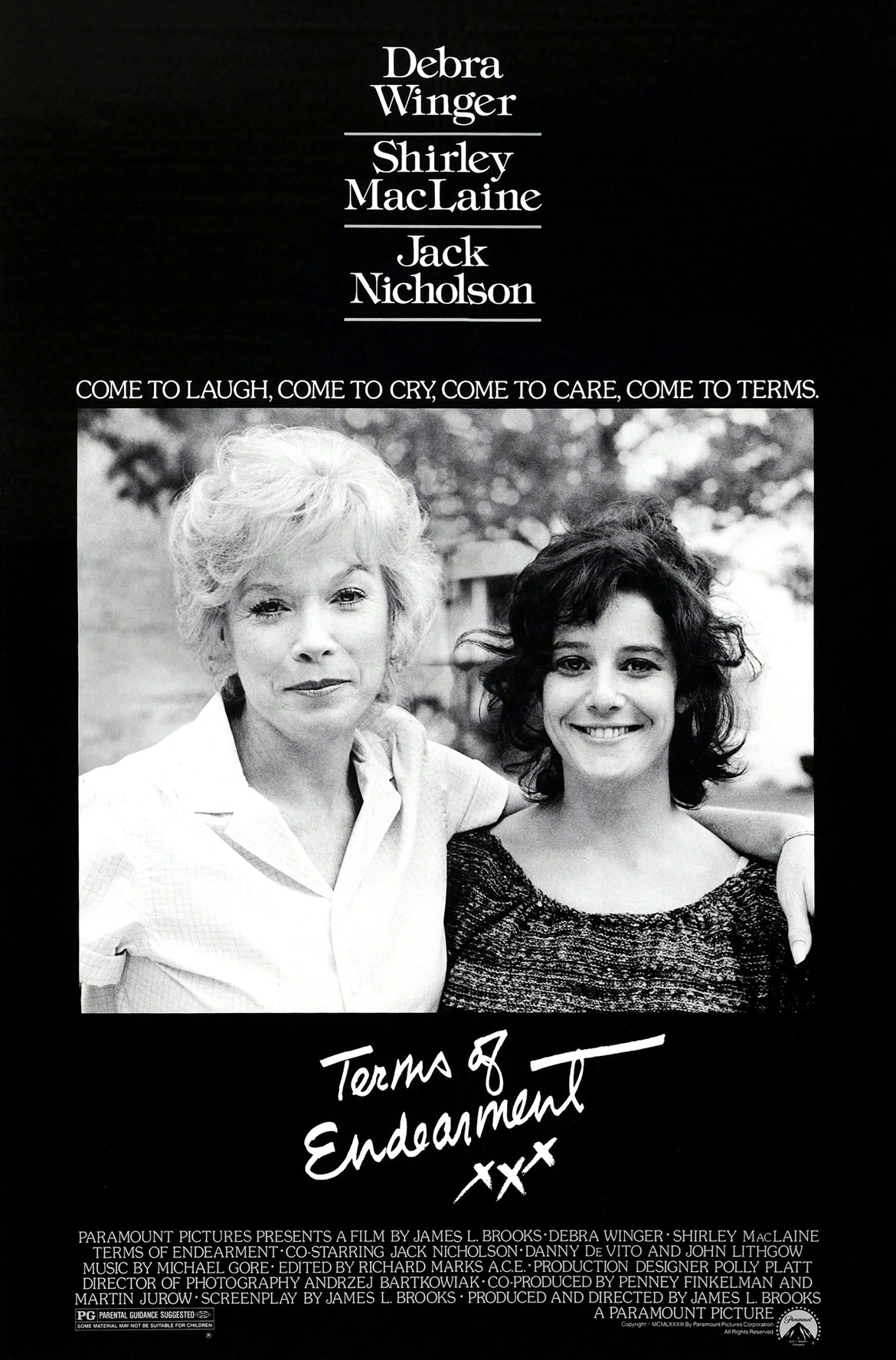 Terms of Endearment is a weepy movie of the week that touches on cancer. I admit it's not bad, but Best
Picture of the Year? I don't think so. One nice thing is nobody treats death as if it's a special thing
which is a relief. The acting is uniformly excellent and low-key. However, the Best Picture award should've
gone to Never Cry Wolf that was surprisingly snubbed across the board for Oscar nominations.
Terms of Endearment is a weepy movie of the week that touches on cancer. I admit it's not bad, but Best
Picture of the Year? I don't think so. One nice thing is nobody treats death as if it's a special thing
which is a relief. The acting is uniformly excellent and low-key. However, the Best Picture award should've
gone to Never Cry Wolf that was surprisingly snubbed across the board for Oscar nominations.
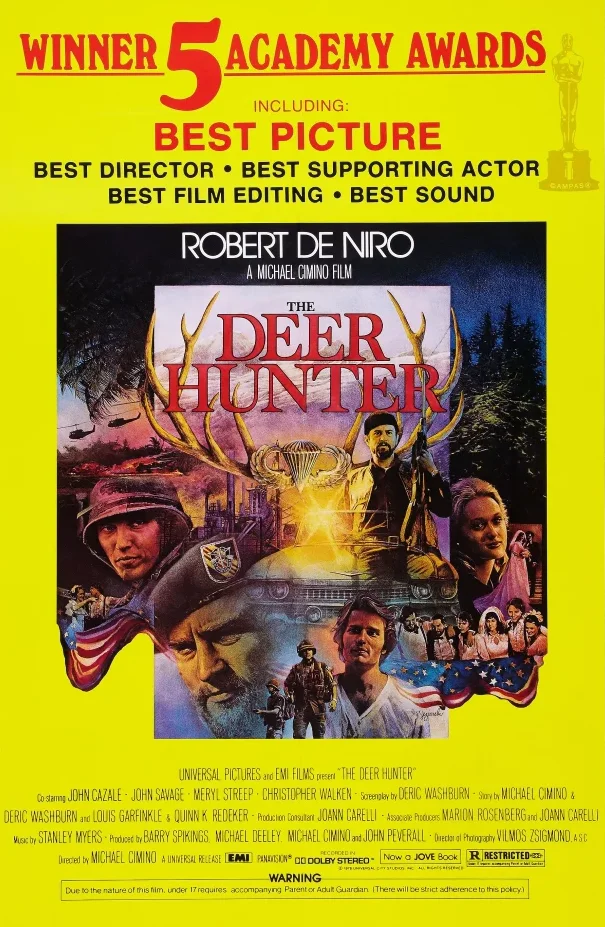 Anyone could predict what's to come in Heaven's Gate because it's all right there in the first hour of
The Deer Hunter which is a sheer waste of celluloid that's akin to watching paint dry. The only reason
why the 184-minute Vietnam epic won Best Picture is Russian roulette. That's all the people could talk about.
Take it away, and The Deer Hunter would be forgotten, hence no Best Picture award. Instead, it should've
gone to Grease.
Anyone could predict what's to come in Heaven's Gate because it's all right there in the first hour of
The Deer Hunter which is a sheer waste of celluloid that's akin to watching paint dry. The only reason
why the 184-minute Vietnam epic won Best Picture is Russian roulette. That's all the people could talk about.
Take it away, and The Deer Hunter would be forgotten, hence no Best Picture award. Instead, it should've
gone to Grease.
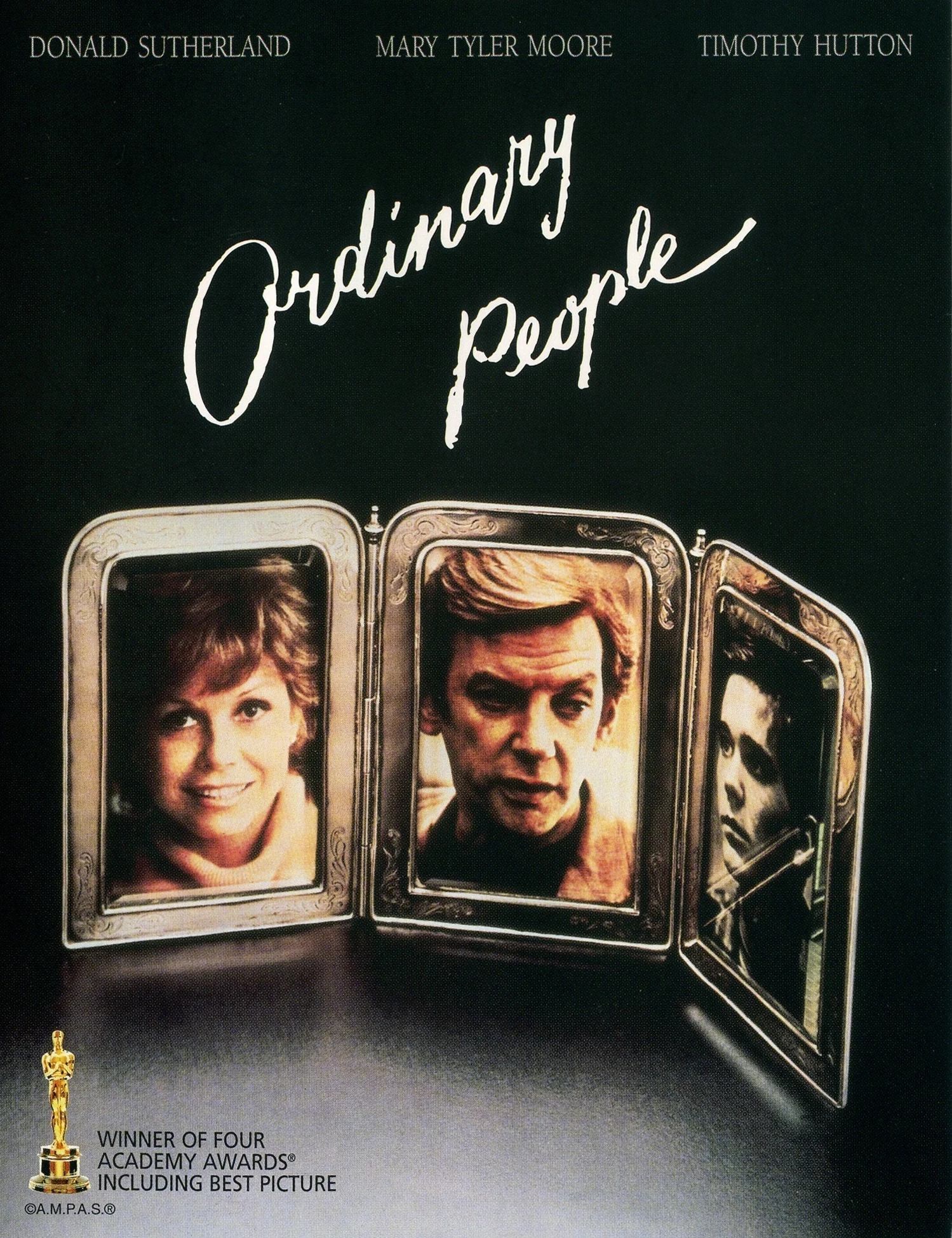 In many ways, Ordinary People is a made-for-TV picture with a theme of the week: Rich People's Problems.
It's not compelling enough for me to care. I've had a hard time swallowing the fact that Donald Sutherland's
character didn't see the dysfunction sooner than later after being together with his wife for over two decades.
What a surprise this one beat out Raging Bull for Best Picture.
In many ways, Ordinary People is a made-for-TV picture with a theme of the week: Rich People's Problems.
It's not compelling enough for me to care. I've had a hard time swallowing the fact that Donald Sutherland's
character didn't see the dysfunction sooner than later after being together with his wife for over two decades.
What a surprise this one beat out Raging Bull for Best Picture.
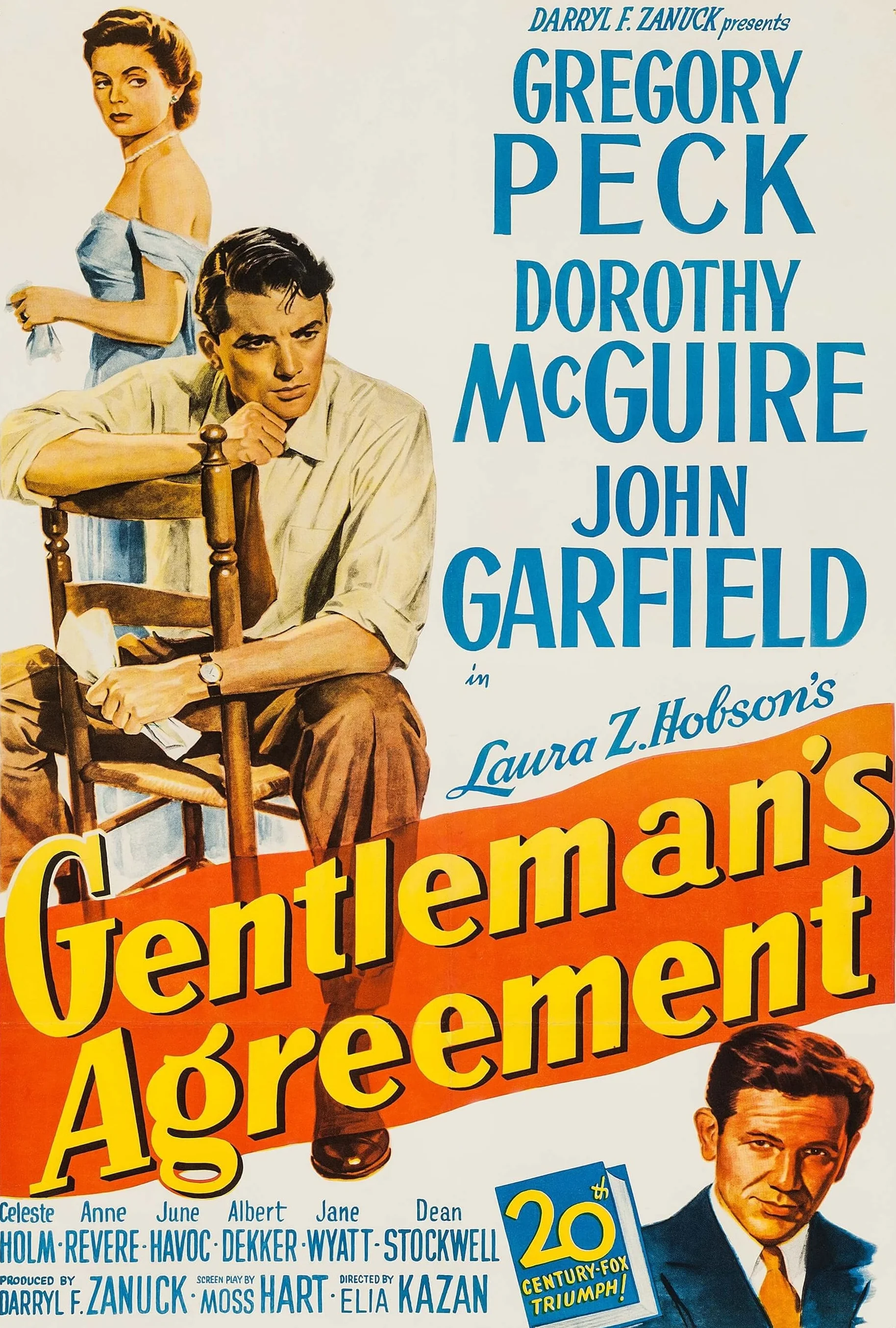 I won't go so far as to say that Gentleman's Agreement, which is one of the first two films to deal with
anti-semitism with the other being Crossfire, is an overrated Best Picture Oscar winner because it's not.
But to think of it as Best Picture material is laughable. It's just not that great, having been poorly made
for the most part. As for 1947, I haven't seen enough movies to make a solid judgment, but so far, it's
The Lady from Shanghai that has my vote.
I won't go so far as to say that Gentleman's Agreement, which is one of the first two films to deal with
anti-semitism with the other being Crossfire, is an overrated Best Picture Oscar winner because it's not.
But to think of it as Best Picture material is laughable. It's just not that great, having been poorly made
for the most part. As for 1947, I haven't seen enough movies to make a solid judgment, but so far, it's
The Lady from Shanghai that has my vote.
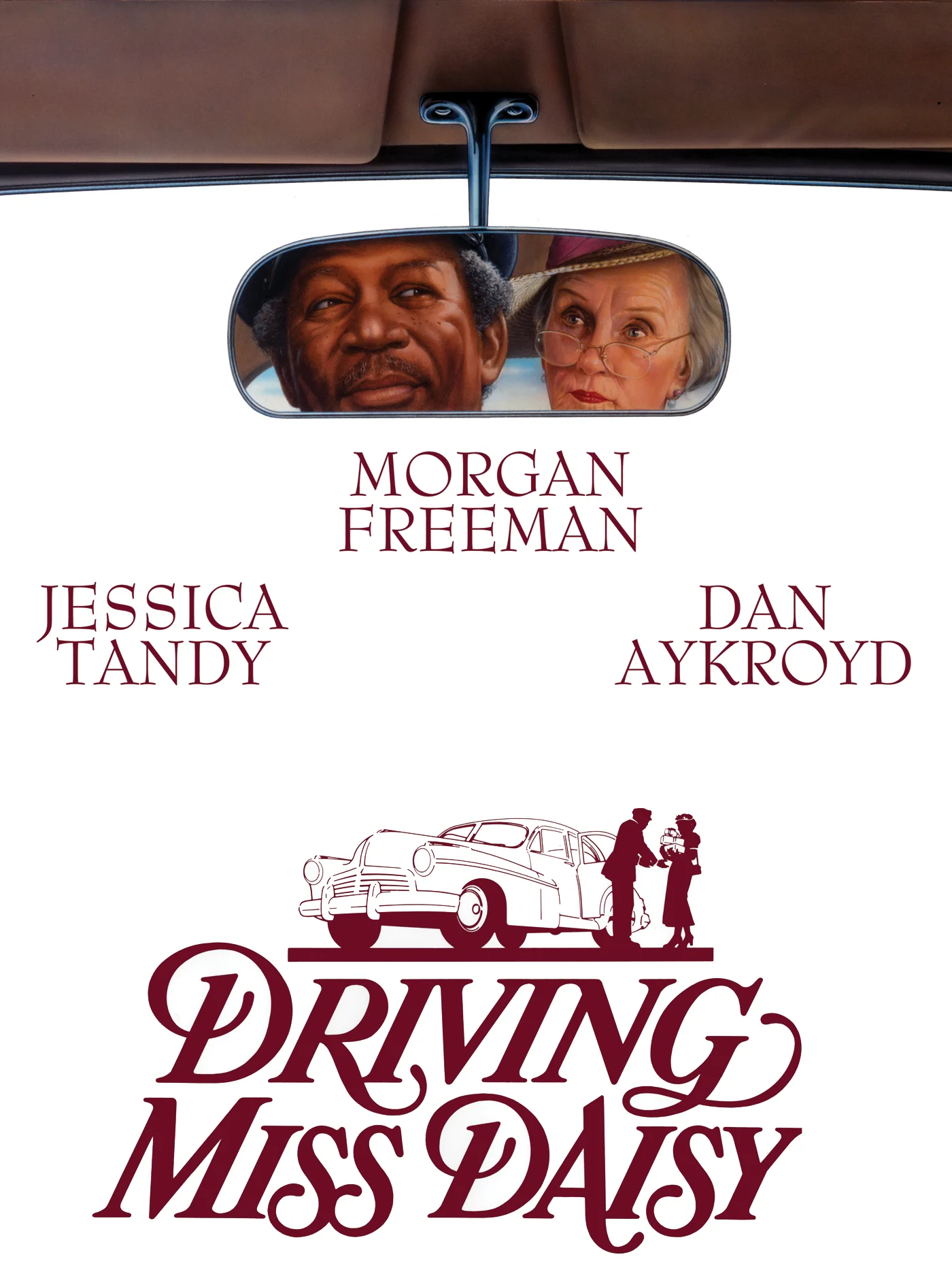 Although I like several aspects of Driving Miss Daisy, it doesn't win me over completely. Despite the
racial undertones not bothering me, it's annoying to see Jessica Tandy's character as the southern belle. If it
was Vivien Leigh instead, I might reconsider my opinion which explains why she got the timeless part for
A Streetcar Named Desire. On the other hand, Morgan Freeman is just great, and 1989 was a particularly
strong year for him which means...Glory should've won Best Picture.
Although I like several aspects of Driving Miss Daisy, it doesn't win me over completely. Despite the
racial undertones not bothering me, it's annoying to see Jessica Tandy's character as the southern belle. If it
was Vivien Leigh instead, I might reconsider my opinion which explains why she got the timeless part for
A Streetcar Named Desire. On the other hand, Morgan Freeman is just great, and 1989 was a particularly
strong year for him which means...Glory should've won Best Picture.
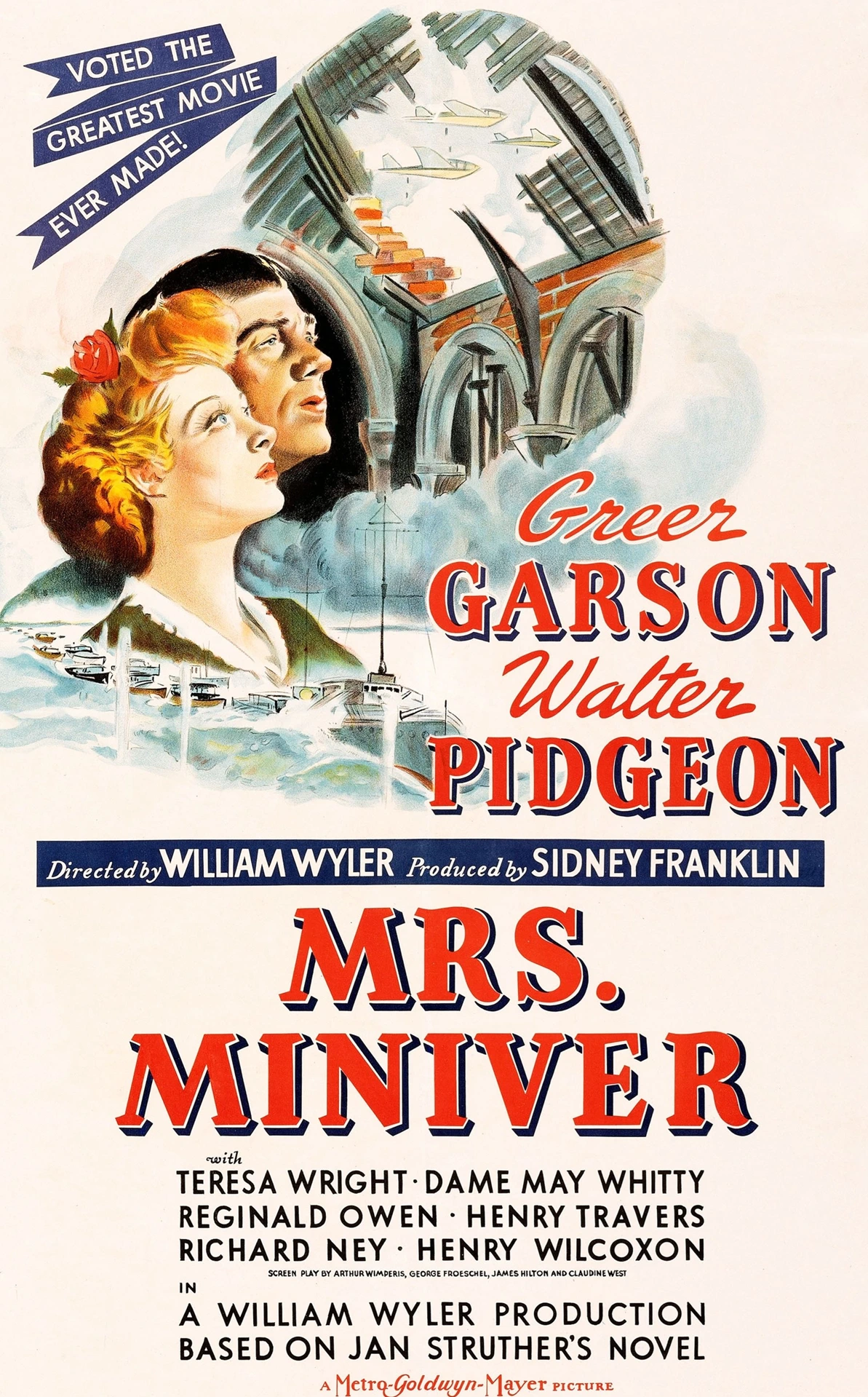 An "average middle-class family" with a mansion, a huge patio, a maid, a fancy car (1936 Lagonda LG45, mind you),
a son attending Oxford University, and elegant clothes in England? Yeah, suuuuure. Greer Garson looks too
beautiful all the time, but doesn't she or anyone else realize there's a war going on? More than anything,
they, save for Richard Ney, are detached, preferring to resume their privileged, sheltered lives, hence
the propaganda. The Best Picture award should've gone to Casablanca, but for technical reasons, it was
put into competition for 1943 instead.
An "average middle-class family" with a mansion, a huge patio, a maid, a fancy car (1936 Lagonda LG45, mind you),
a son attending Oxford University, and elegant clothes in England? Yeah, suuuuure. Greer Garson looks too
beautiful all the time, but doesn't she or anyone else realize there's a war going on? More than anything,
they, save for Richard Ney, are detached, preferring to resume their privileged, sheltered lives, hence
the propaganda. The Best Picture award should've gone to Casablanca, but for technical reasons, it was
put into competition for 1943 instead.
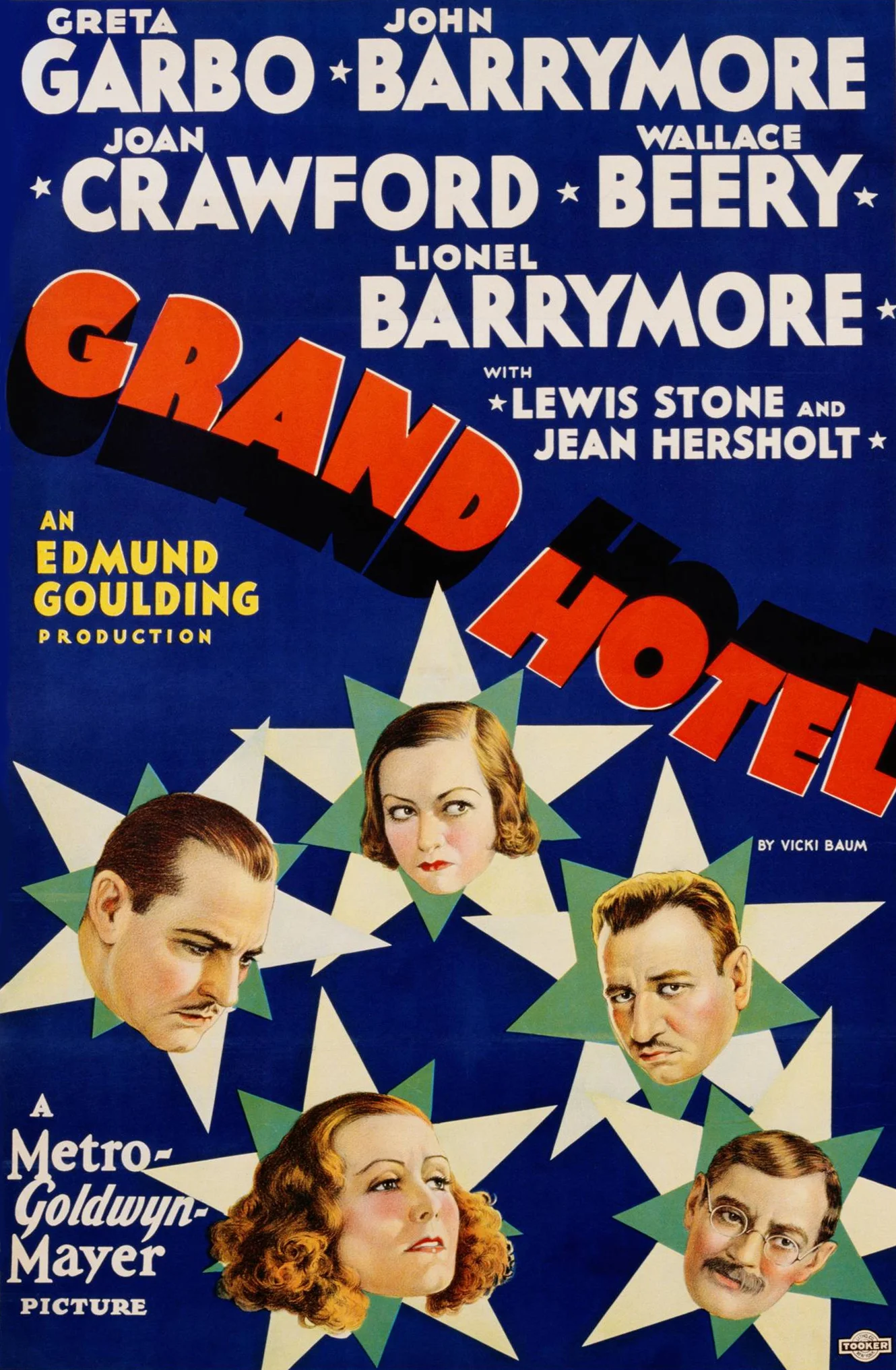 Grand Hotel is dated but can be charming at times given the lineup of classic Hollywood. Nothing sums up
the film better than the famous quote by Lewis Stone's Two-Face Harvey: "Grand Hotel. People come, people go.
Nothing ever happens." It's exactly how I feel. No matter what, there are some brilliant shots. The true Best
Picture of 1932 is I Am a Fugutive from a Chain Gang with the wonderful Paul Muni.
Grand Hotel is dated but can be charming at times given the lineup of classic Hollywood. Nothing sums up
the film better than the famous quote by Lewis Stone's Two-Face Harvey: "Grand Hotel. People come, people go.
Nothing ever happens." It's exactly how I feel. No matter what, there are some brilliant shots. The true Best
Picture of 1932 is I Am a Fugutive from a Chain Gang with the wonderful Paul Muni.
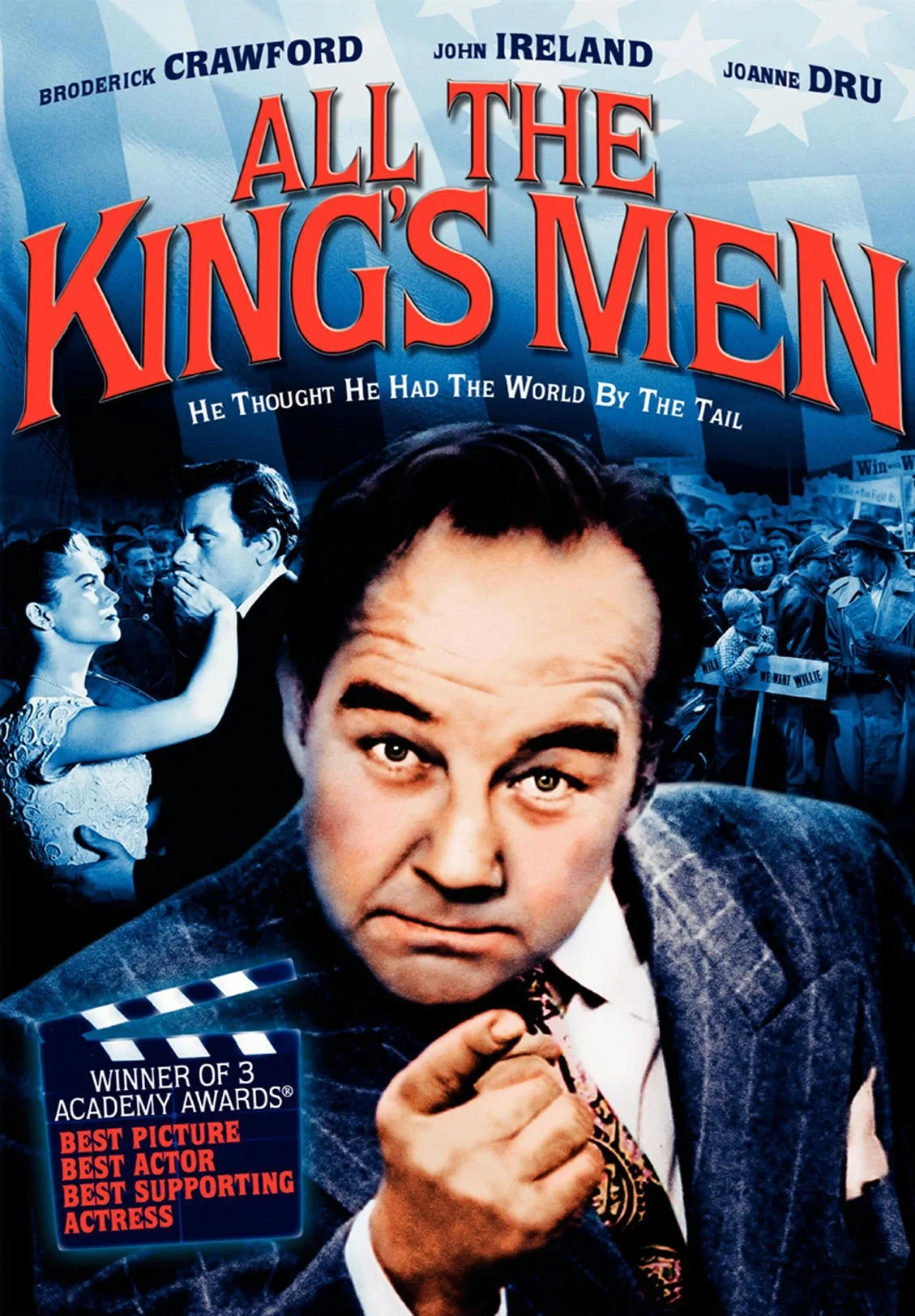 All the King's Men makes for a fair viewing, but it paints a simplistic picture of dirty politics.
The acting is okay. Nobody stands out. Therefore, the Oscars for Broderick Crawford, who was drunk during the
filming, and Mercedes McCambridge, in her screen debut, are undeserving. So is the Best Picture nod. It should've
gone to D.O.A. instead.
All the King's Men makes for a fair viewing, but it paints a simplistic picture of dirty politics.
The acting is okay. Nobody stands out. Therefore, the Oscars for Broderick Crawford, who was drunk during the
filming, and Mercedes McCambridge, in her screen debut, are undeserving. So is the Best Picture nod. It should've
gone to D.O.A. instead.
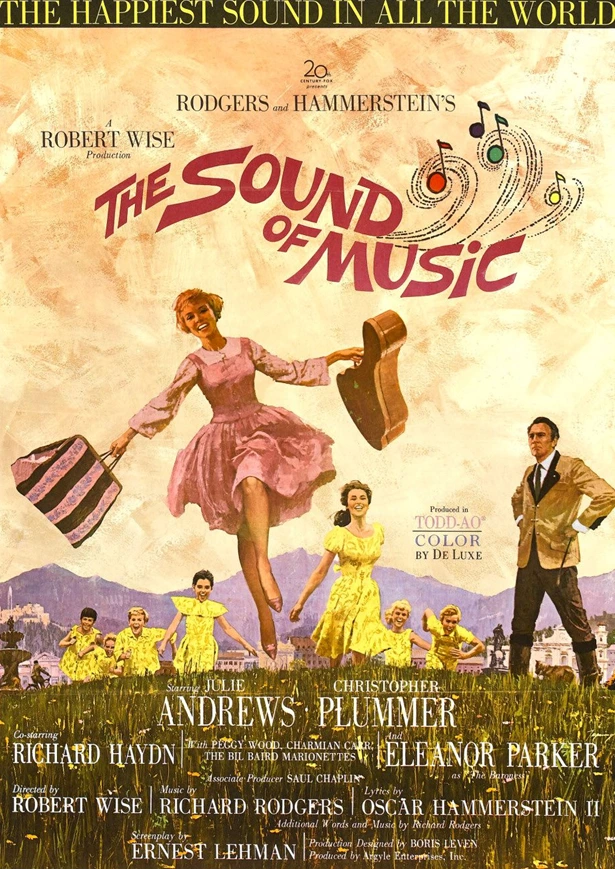 The Sound of Music looks nice and all, but three hours? That's too long. I had to take a break from time
to time. Story-wise, there isn't much of substance. Sure, Julie Andrews sings well, the cinematography of Austria
is splendid, and the interiors (all done on a soundstage in Los Angeles) are fancy. But the whole thing is so
simpleminded. Therefore, the Best Picture award should've been given to The Spy Who Came in from the Cold.
The Sound of Music looks nice and all, but three hours? That's too long. I had to take a break from time
to time. Story-wise, there isn't much of substance. Sure, Julie Andrews sings well, the cinematography of Austria
is splendid, and the interiors (all done on a soundstage in Los Angeles) are fancy. But the whole thing is so
simpleminded. Therefore, the Best Picture award should've been given to The Spy Who Came in from the Cold.
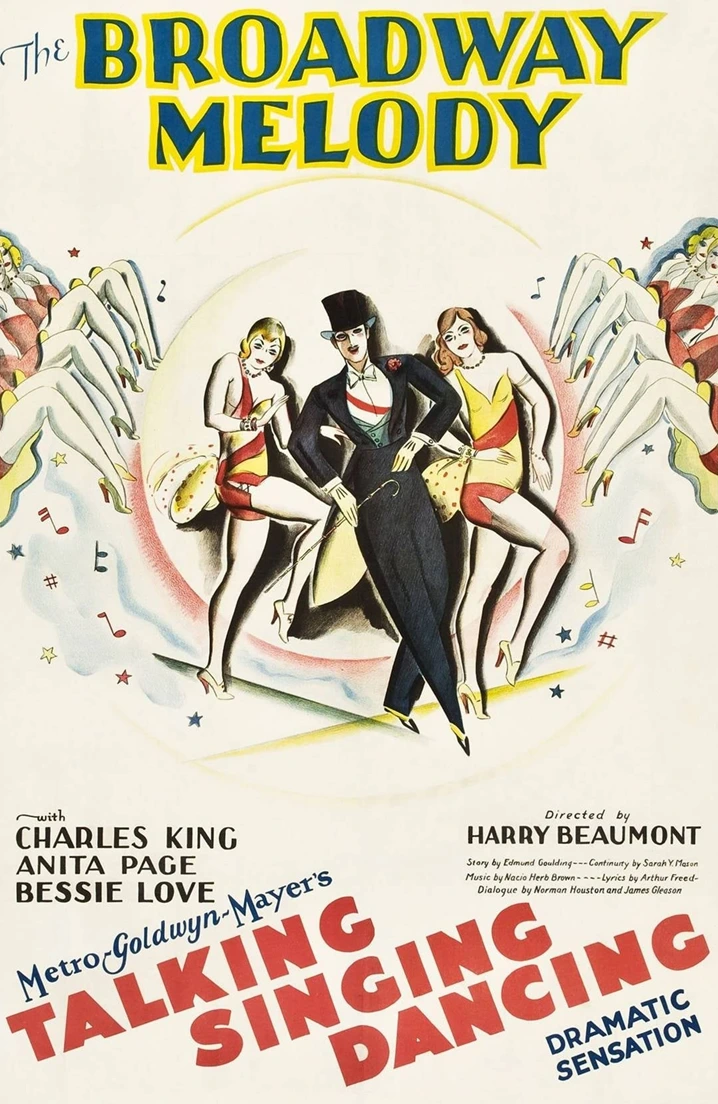 Bessie Love gets the most credit for providing The Broadway Melody, the second Best Picture winner ever,
a pulse. If not for her, it would've fallen apart sooner than later. That's why she was unofficially rewarded
with a Best Actress Oscar nomination. Whenever musical numbers are shown on the stage, they come off as cheap,
two-dimensional, and not well-rehearsed. Despite not having seen much from 1929, The Canary Murder Case
is best picture of the year.
Bessie Love gets the most credit for providing The Broadway Melody, the second Best Picture winner ever,
a pulse. If not for her, it would've fallen apart sooner than later. That's why she was unofficially rewarded
with a Best Actress Oscar nomination. Whenever musical numbers are shown on the stage, they come off as cheap,
two-dimensional, and not well-rehearsed. Despite not having seen much from 1929, The Canary Murder Case
is best picture of the year.
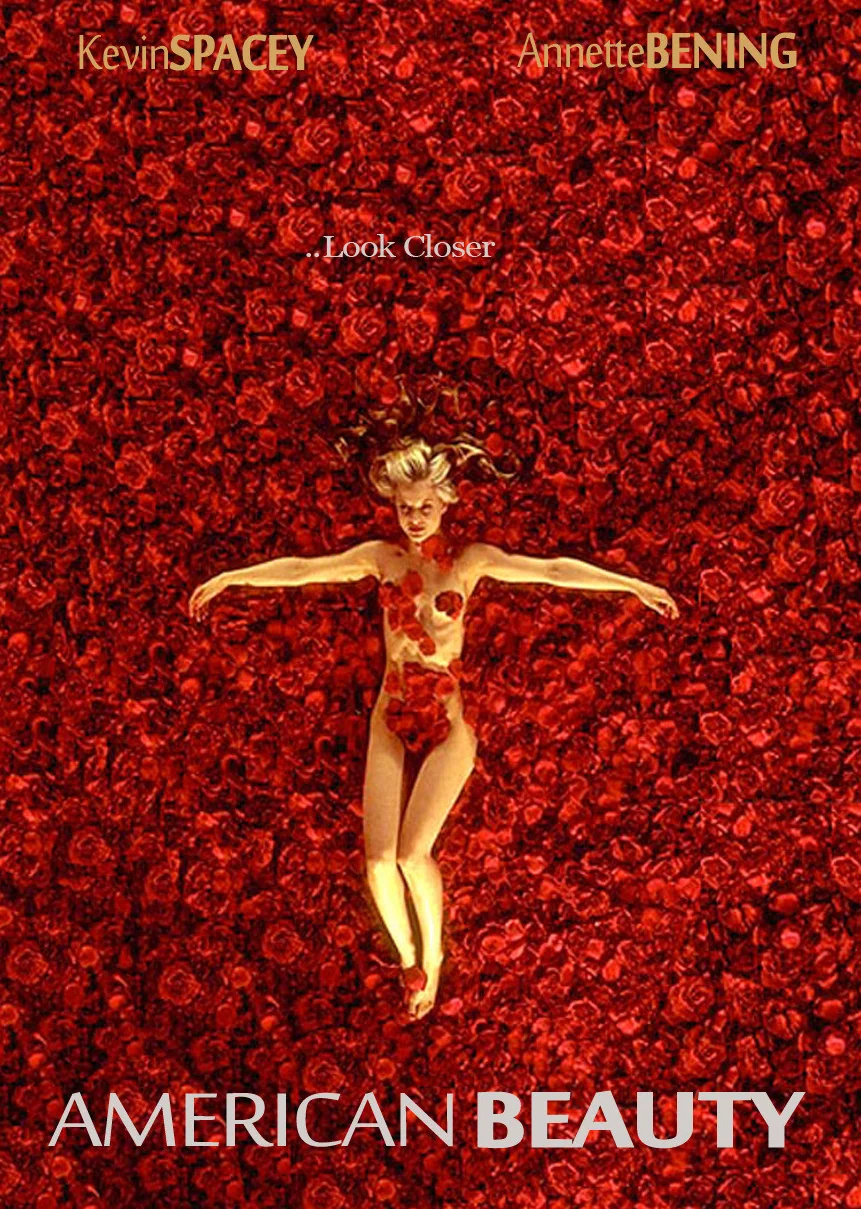 American Beauty is an overrated movie that offers oversimplified generalizations for certain
personality types. Notice the characters showed no evidence of being part of a social group? It's impossible
based on how they conduct their business, and therefore, that's what makes the outcomes unlikely. There are
way better choices for Best Picture, and the true winner is Boys Don't Cry.
American Beauty is an overrated movie that offers oversimplified generalizations for certain
personality types. Notice the characters showed no evidence of being part of a social group? It's impossible
based on how they conduct their business, and therefore, that's what makes the outcomes unlikely. There are
way better choices for Best Picture, and the true winner is Boys Don't Cry.
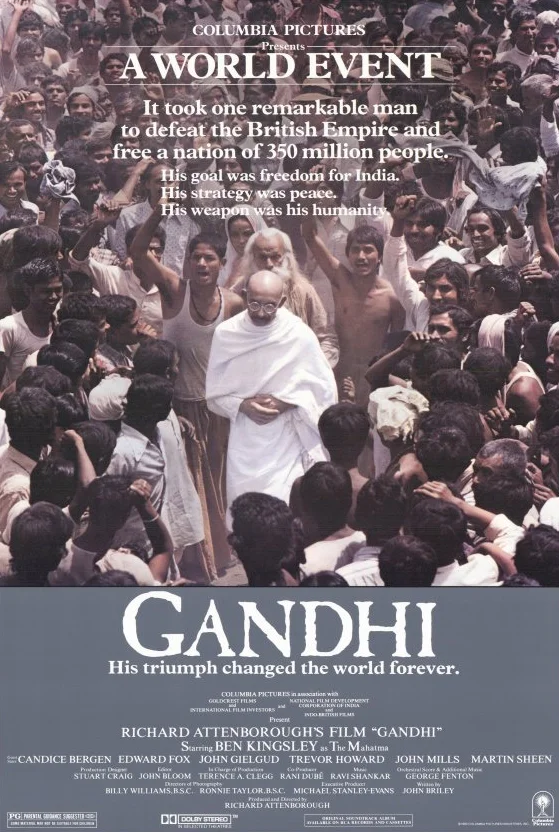 Gandhi is too long, clocking for more than three hours which is expected for an epic and therefore leaving
me for dead. A white actor pretending to be an Indian, Ben Kingsley is full of himself. Gandhi was a racist
person, not believing in equality for all people of different races and social classes. He also forced a lot of
women, especially his young relatives, to sleep naked with him. So much for the "hero." How about giving the
Best Picture to one of the most beloved movies of all time: E.T. the Extra-Terrestrial?
Gandhi is too long, clocking for more than three hours which is expected for an epic and therefore leaving
me for dead. A white actor pretending to be an Indian, Ben Kingsley is full of himself. Gandhi was a racist
person, not believing in equality for all people of different races and social classes. He also forced a lot of
women, especially his young relatives, to sleep naked with him. So much for the "hero." How about giving the
Best Picture to one of the most beloved movies of all time: E.T. the Extra-Terrestrial?
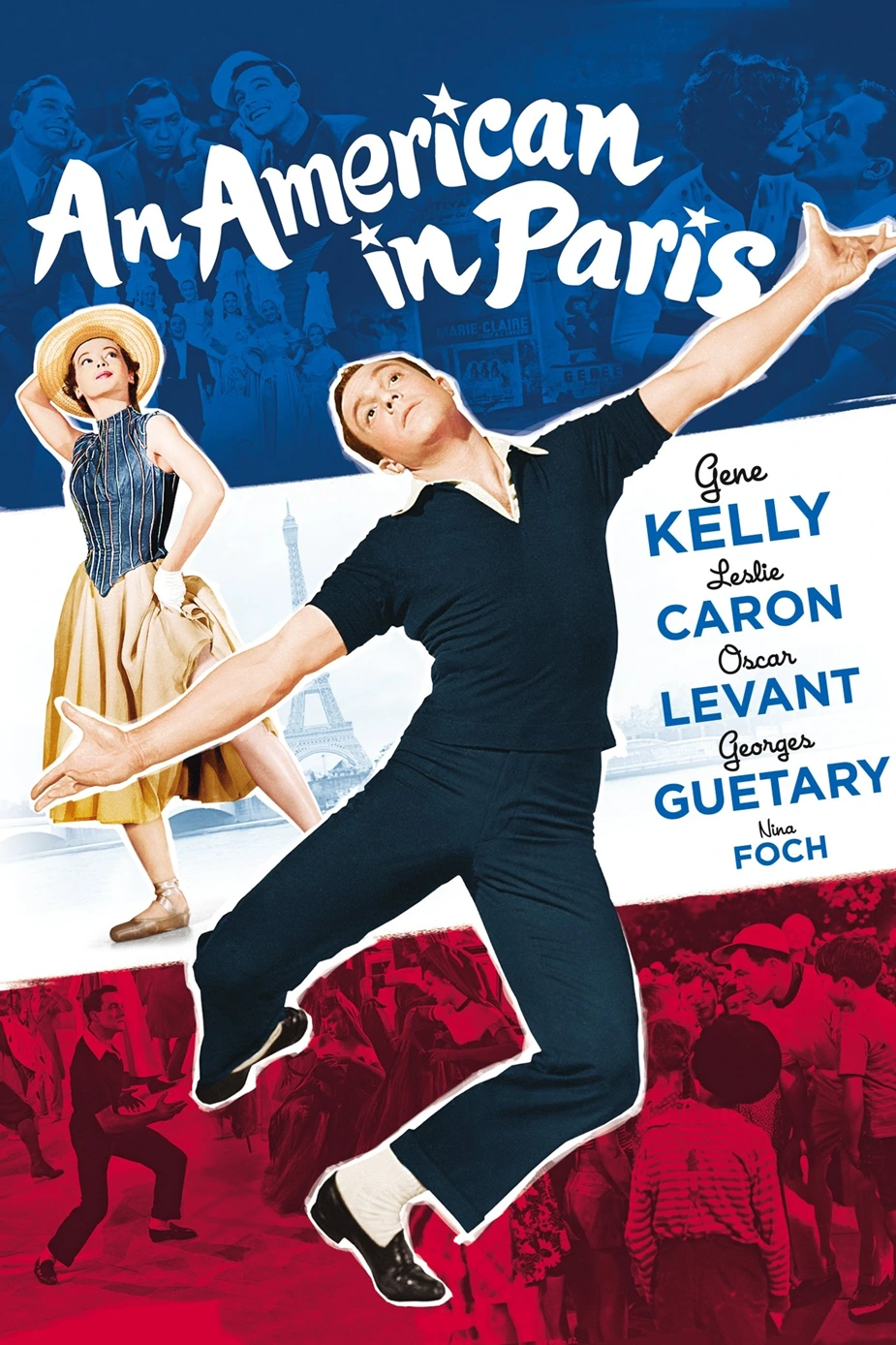 If the Academy had the foresight that Singin' in the Rain was going to come out the following year,
An American in Paris wouldn't gotten a boatload of Oscars including Best Picture (over
A Streetcar Named Desire!). It's not even a good movie to begin with. What plot? There isn't any except
for this: creepy guy turns down an older woman for a teenager. No, no, no...give me Stanley Kowalski and
Blanche DuBois any time of the day.
If the Academy had the foresight that Singin' in the Rain was going to come out the following year,
An American in Paris wouldn't gotten a boatload of Oscars including Best Picture (over
A Streetcar Named Desire!). It's not even a good movie to begin with. What plot? There isn't any except
for this: creepy guy turns down an older woman for a teenager. No, no, no...give me Stanley Kowalski and
Blanche DuBois any time of the day.
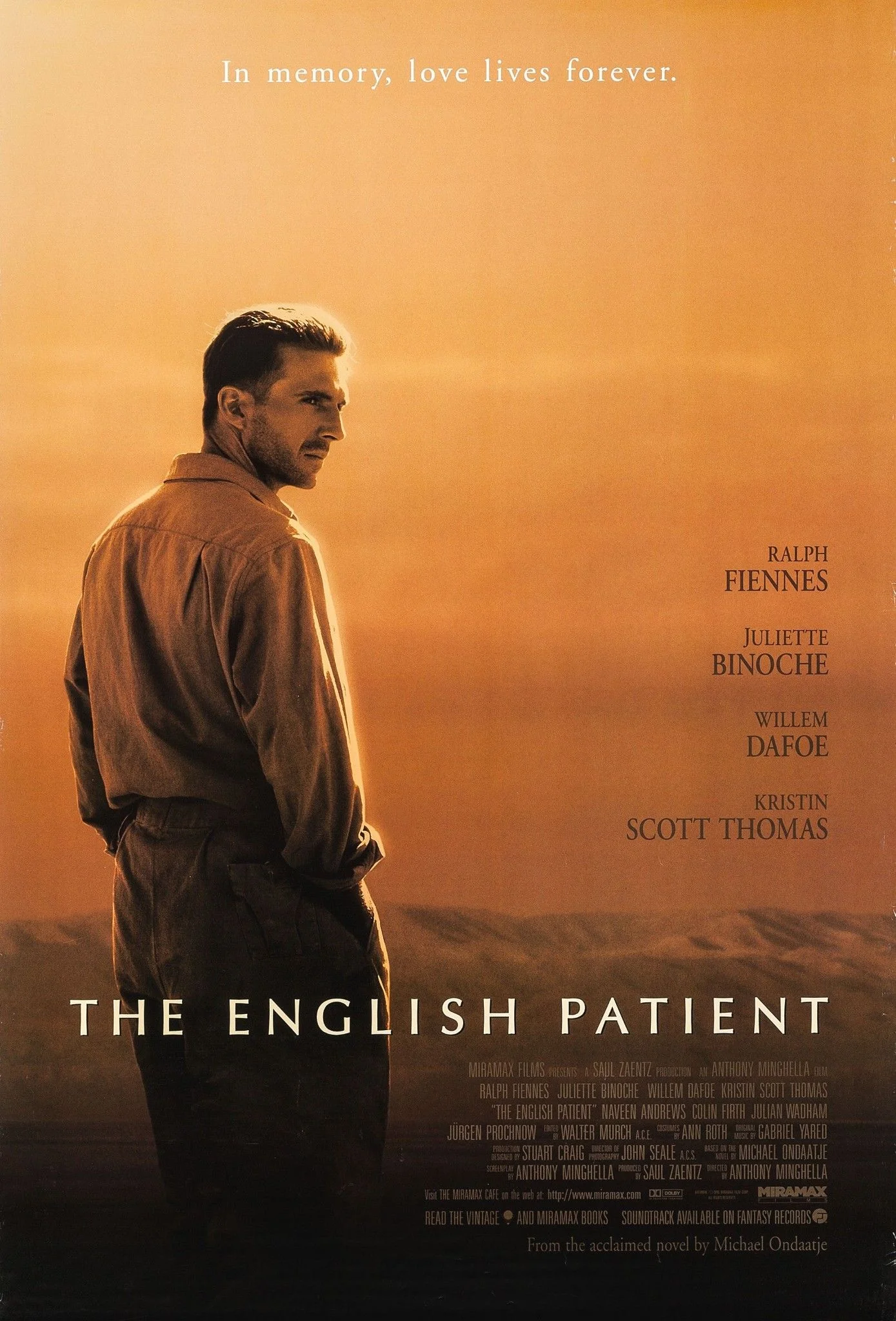 There are some Best Picture winners I would quickly dismiss after seeing them during initial release, and
The English Patient is one of them. The love story makes no impression on me; it's just an ordinary movie
that runs far too long. Juliette Binoche is the single worst thing about it. She wanting to make the whole thing
to be all about her character is damn ridiculous. Anyway, my choice for 1996 is The Crucible.
There are some Best Picture winners I would quickly dismiss after seeing them during initial release, and
The English Patient is one of them. The love story makes no impression on me; it's just an ordinary movie
that runs far too long. Juliette Binoche is the single worst thing about it. She wanting to make the whole thing
to be all about her character is damn ridiculous. Anyway, my choice for 1996 is The Crucible.
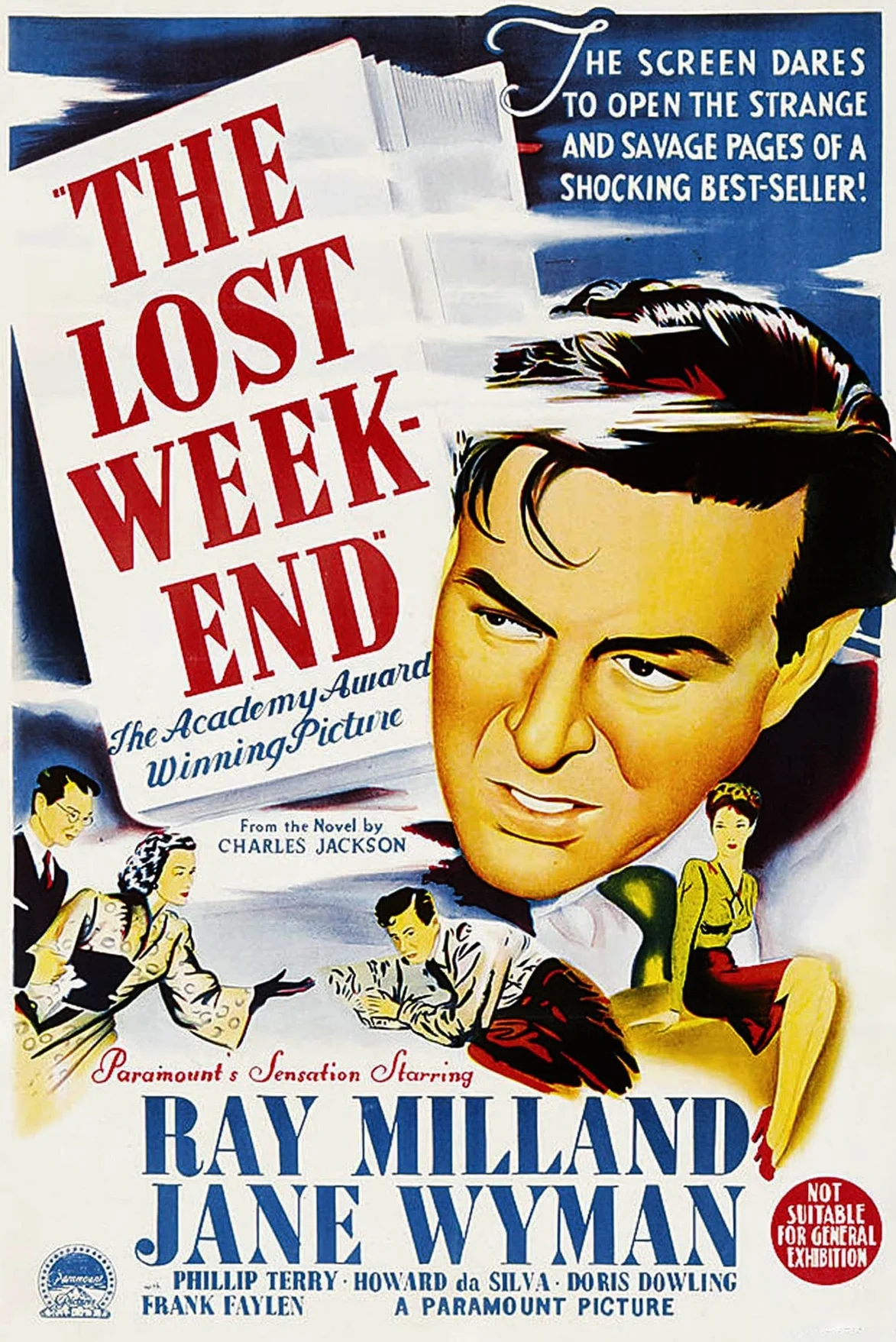 Can I hear a round of applause for the one of the most overrated Best Pictures of all time:
The Lost Weekend?!? What the hell were they thinking back then? The topic has been played so many times
throughout the history of cinema that I'm convinced the role of an alcoholic is by far the easiest. All an actor
has to do is to get drunk and bingo! An Oscar on a silver platter. It's exactly what happened to Ray Milland.
Despite not having seen much from 1945, I choose And Then There Were None for Best Picture.
Can I hear a round of applause for the one of the most overrated Best Pictures of all time:
The Lost Weekend?!? What the hell were they thinking back then? The topic has been played so many times
throughout the history of cinema that I'm convinced the role of an alcoholic is by far the easiest. All an actor
has to do is to get drunk and bingo! An Oscar on a silver platter. It's exactly what happened to Ray Milland.
Despite not having seen much from 1945, I choose And Then There Were None for Best Picture.
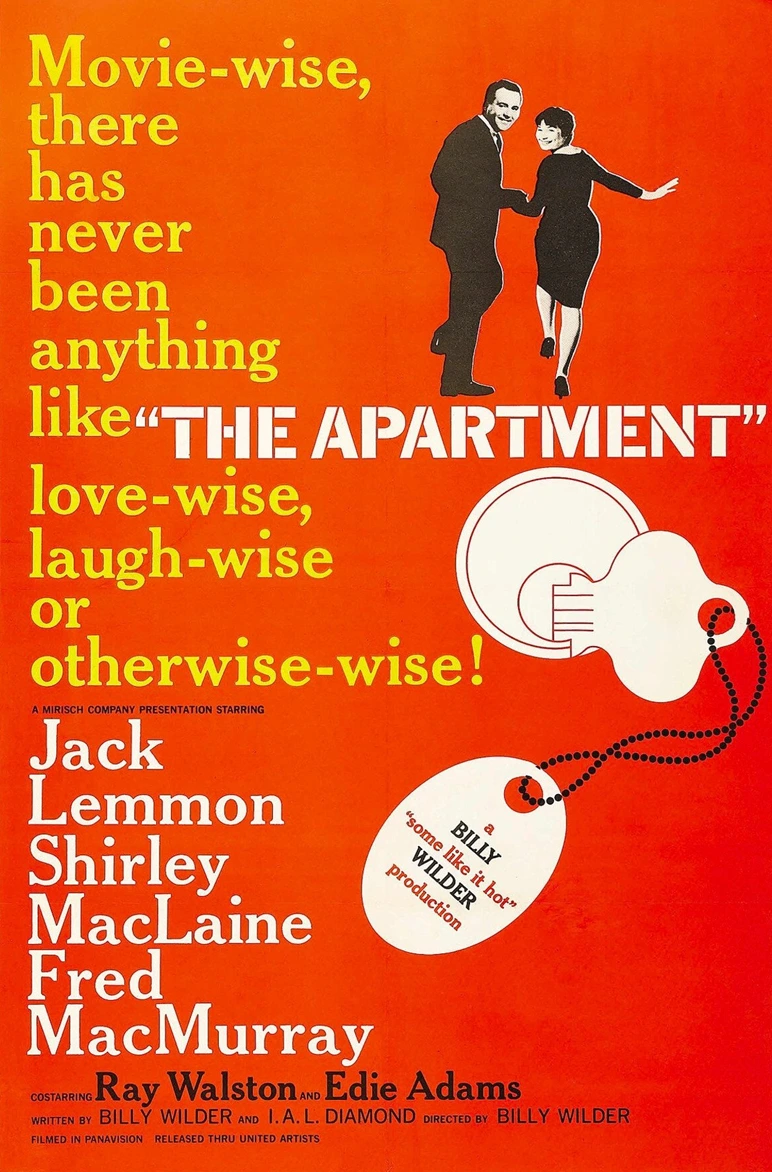 Five Oscars including Best Picture went to The Apartment...really? That wasn't an outstanding movie but
rather disgusting. Did the voters back then notice the little film called Psycho by Alfred Hitchcock?
Of course not...it wasn't even nominated. Today, everybody knows Psycho is one of the greatest movies
ever made and remains timeless while The Apartment should be forgotten for good.
Five Oscars including Best Picture went to The Apartment...really? That wasn't an outstanding movie but
rather disgusting. Did the voters back then notice the little film called Psycho by Alfred Hitchcock?
Of course not...it wasn't even nominated. Today, everybody knows Psycho is one of the greatest movies
ever made and remains timeless while The Apartment should be forgotten for good.
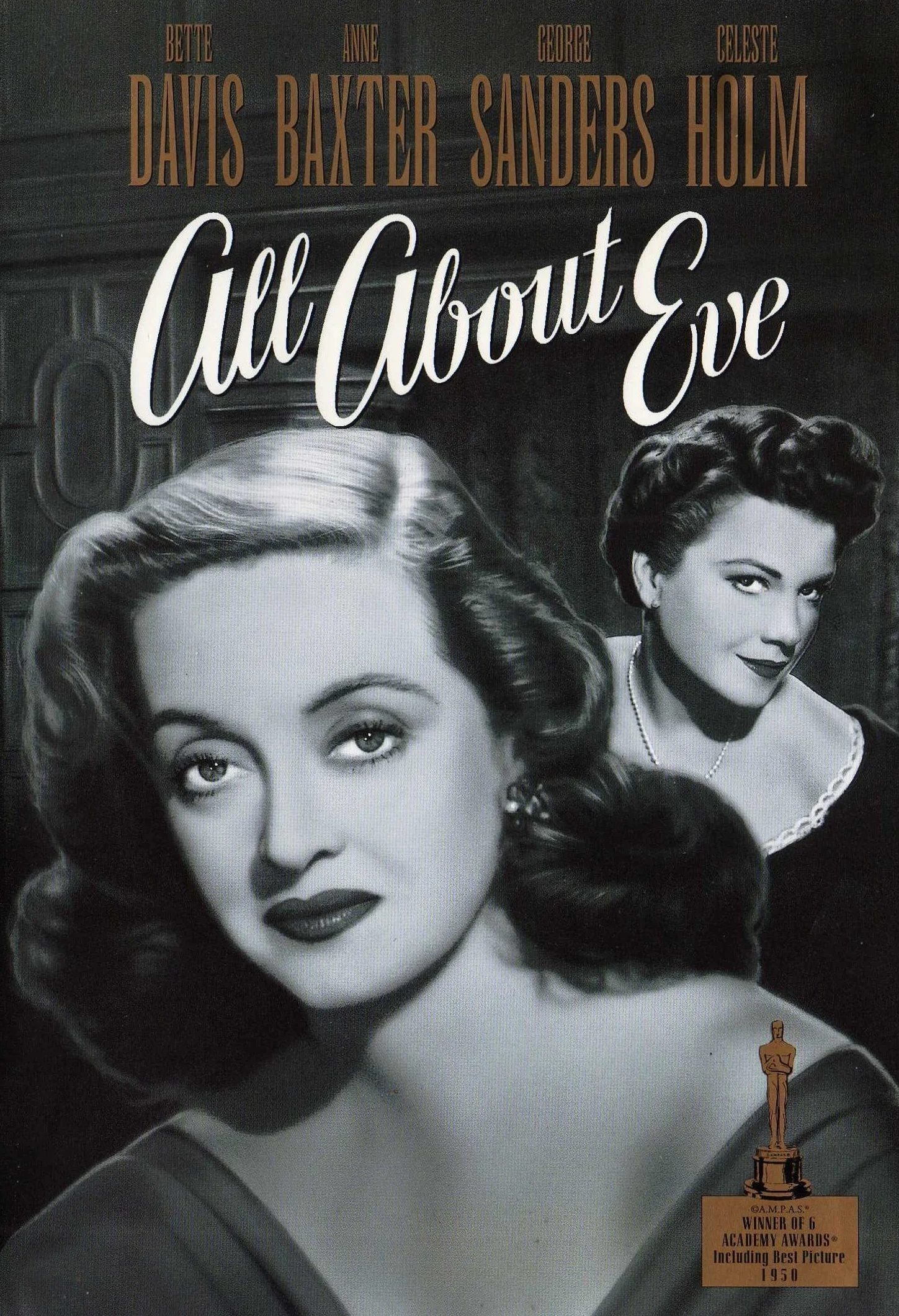 Bette Davis is nothing special and is thus plain. Her oft-quoted line "Fasten your seatbelts. It's going to be a
bumpy night" doesn't do anything for me. The trouble with the whole show is it's too talky. The writing is fine,
but if Joseph L. Mankiewicz could cut the number of words down greatly, it would be a more tolerable movie to
sit through. Sunset Boulevard should've won Best Picture instead.
Bette Davis is nothing special and is thus plain. Her oft-quoted line "Fasten your seatbelts. It's going to be a
bumpy night" doesn't do anything for me. The trouble with the whole show is it's too talky. The writing is fine,
but if Joseph L. Mankiewicz could cut the number of words down greatly, it would be a more tolerable movie to
sit through. Sunset Boulevard should've won Best Picture instead.
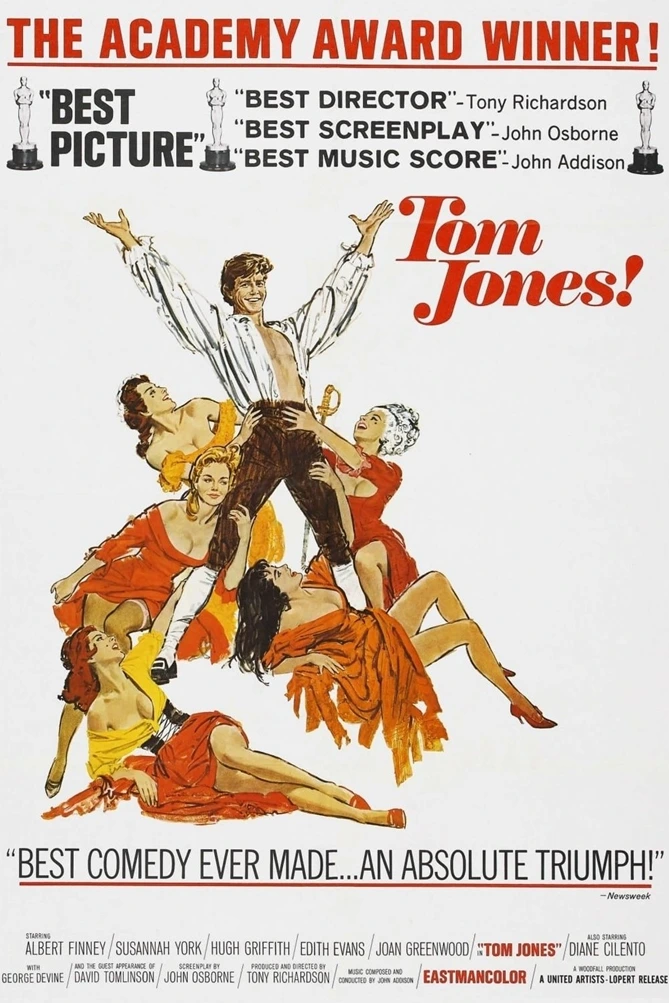 You will always find Tom Jones dead last in terms of popularity when it comes to Best Picture winners
of the 60's. Why is that? It's simply not good and shouldn't have been considered in the first place. Had
The Great Escape been given its rightful claim to the award, that would satisfy everybody, even today,
by living up to the prestigious image of Best Picture. Why...the year before was
Lawrence of Arabia. The size and scope of both are about the same.
You will always find Tom Jones dead last in terms of popularity when it comes to Best Picture winners
of the 60's. Why is that? It's simply not good and shouldn't have been considered in the first place. Had
The Great Escape been given its rightful claim to the award, that would satisfy everybody, even today,
by living up to the prestigious image of Best Picture. Why...the year before was
Lawrence of Arabia. The size and scope of both are about the same.
 West Side Story claims to be about overcoming racism yet is full of racism. What a fucking twist of
irony. It's impossible to overlook the brownfaced Sharks as Puerto Ricans. The goal is to have everybody with
the same tone of color so I'll be able to differentiate them from the Jets. Yet nearly everybody is either white,
Filipino, or Greek. Only one, Rita Moreno, is an actual Puerto Rican, but her skin color wasn't deemed good
enough. Thus, she was forced to look darker. Despite not seeing many movies from 1961, I pick One-Eyed Jacks.
West Side Story claims to be about overcoming racism yet is full of racism. What a fucking twist of
irony. It's impossible to overlook the brownfaced Sharks as Puerto Ricans. The goal is to have everybody with
the same tone of color so I'll be able to differentiate them from the Jets. Yet nearly everybody is either white,
Filipino, or Greek. Only one, Rita Moreno, is an actual Puerto Rican, but her skin color wasn't deemed good
enough. Thus, she was forced to look darker. Despite not seeing many movies from 1961, I pick One-Eyed Jacks.
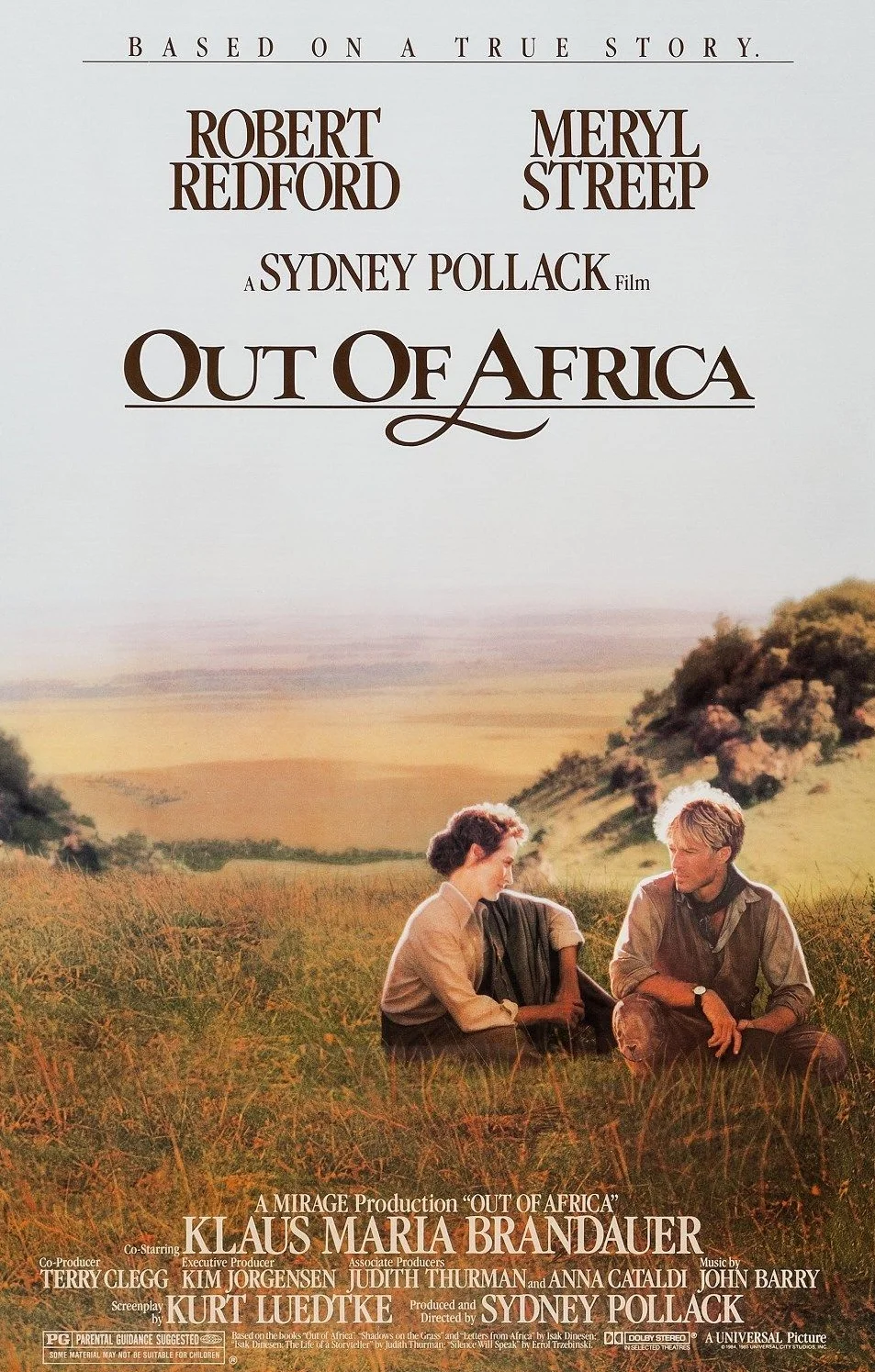 When I think of Africa, two things that immediately come to my mind are: AIDS and big-game hunting.
Out of Africa has both except it's syphilis instead of AIDS. Long, superficial, episodic, detached, and
boring, it's the worst Best Picture winner of the 80's. There's no question about it. Hence,
The Color Purple got unfairly shut out because of racism.
When I think of Africa, two things that immediately come to my mind are: AIDS and big-game hunting.
Out of Africa has both except it's syphilis instead of AIDS. Long, superficial, episodic, detached, and
boring, it's the worst Best Picture winner of the 80's. There's no question about it. Hence,
The Color Purple got unfairly shut out because of racism.
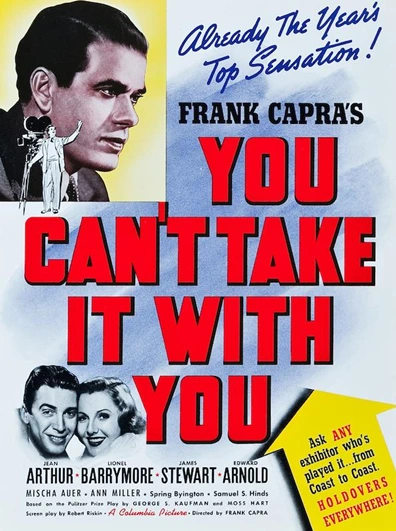 All I can say is: boring, boring, boring. It's a forced hodgepodge type of movie involving half-retards and
snobs. The story is rarely focused. When it is, that's due to a few strong scenes with Lionel Barrymore.
While watching the film, I thought of It's a Wonderful Life and how much better it was. There was
clarity from start to finish in a dramatic manner to teach life lessons. The other one is rather sloppy in
reaching a moral that's ultimately artificial. Despite not seeing much from 1938, my choice for Best Picture
is The Lady Vanishes.
All I can say is: boring, boring, boring. It's a forced hodgepodge type of movie involving half-retards and
snobs. The story is rarely focused. When it is, that's due to a few strong scenes with Lionel Barrymore.
While watching the film, I thought of It's a Wonderful Life and how much better it was. There was
clarity from start to finish in a dramatic manner to teach life lessons. The other one is rather sloppy in
reaching a moral that's ultimately artificial. Despite not seeing much from 1938, my choice for Best Picture
is The Lady Vanishes.
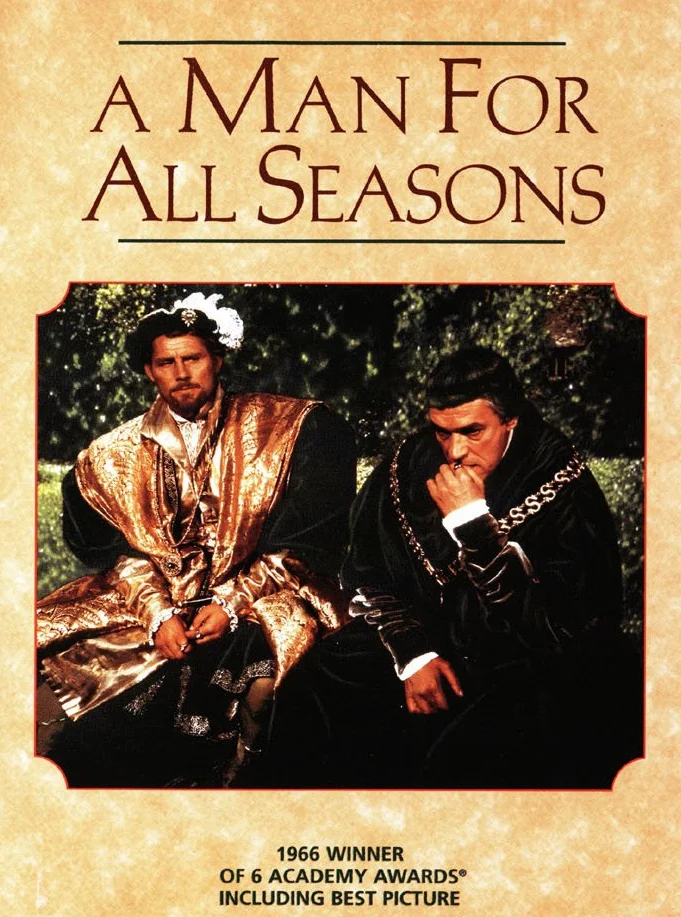 Yawning incessantly during A Man for All Seasons, all I could think of was "who cares?" Indeed so!
Basically, the plot is this: a Lord Chancellor refused to give the King his consent for divorce and was
summarily executed afterwards. And that's it. This stuff happened over 500 years ago. Oh, gosh....who cares???
You're putting me to sleep. Give the Best Picture to Who's Afraid of Virginia Woolf? already!
Yawning incessantly during A Man for All Seasons, all I could think of was "who cares?" Indeed so!
Basically, the plot is this: a Lord Chancellor refused to give the King his consent for divorce and was
summarily executed afterwards. And that's it. This stuff happened over 500 years ago. Oh, gosh....who cares???
You're putting me to sleep. Give the Best Picture to Who's Afraid of Virginia Woolf? already!
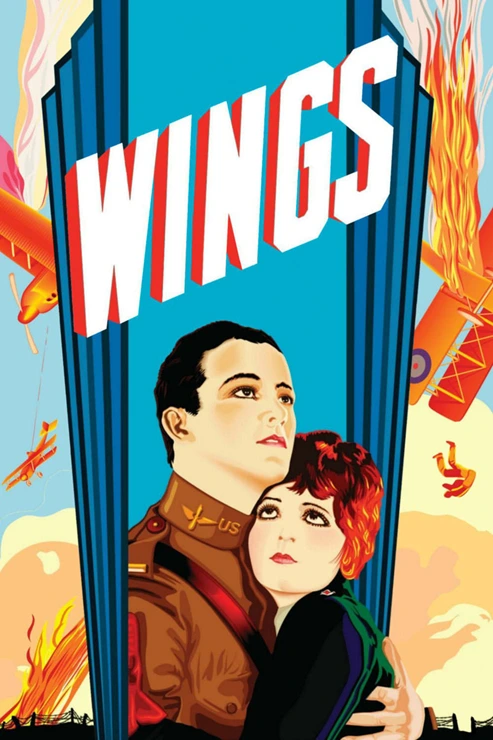 Wings is the first Best Picture winner ever. The first hour goes well with excellent photography. Then
come problems...and more problems. There are too many battle scenes, enough to leave me feeling nauseous.
Therefore, 144 minutes is too much. An hour less will do. There's no reason to keep repeating the same stuff at
least ten times if I get the point already. Since Wings was made in 1927, there's no reason to continue
watching more films until one of them emerges as a better choice.
Wings is the first Best Picture winner ever. The first hour goes well with excellent photography. Then
come problems...and more problems. There are too many battle scenes, enough to leave me feeling nauseous.
Therefore, 144 minutes is too much. An hour less will do. There's no reason to keep repeating the same stuff at
least ten times if I get the point already. Since Wings was made in 1927, there's no reason to continue
watching more films until one of them emerges as a better choice.
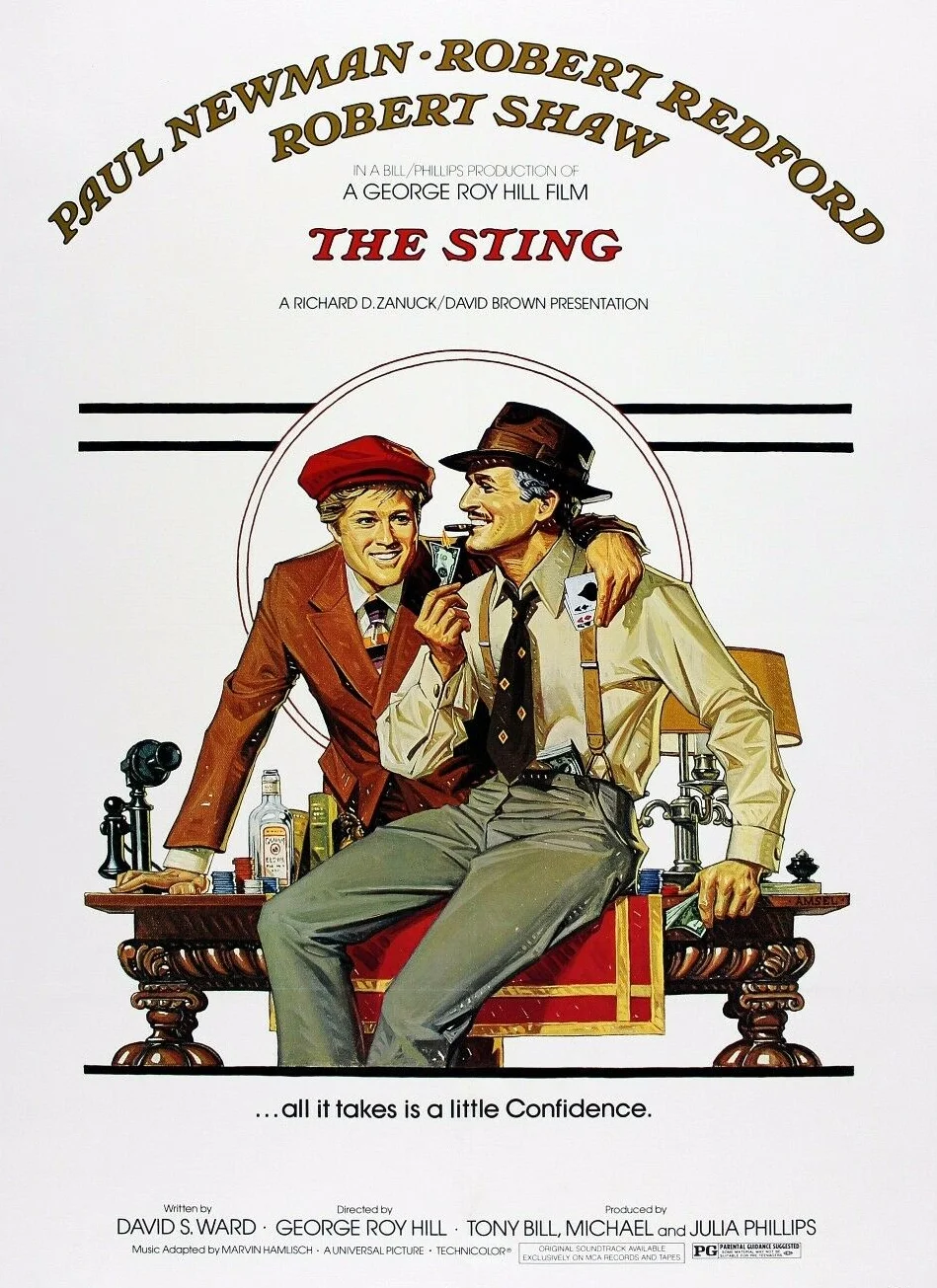 The Sting is a dull, overrated Best Picture winner. I guess just because the movie has Robert Redford and
Paul Newman it automatically has to win every award there is. This one never got my attention like
The Exorcist did. But the true Best Picture winner of 1973 is Papillon, thanks to the powerful
performances put on by Steve McQueen and Dustin Hoffman.
The Sting is a dull, overrated Best Picture winner. I guess just because the movie has Robert Redford and
Paul Newman it automatically has to win every award there is. This one never got my attention like
The Exorcist did. But the true Best Picture winner of 1973 is Papillon, thanks to the powerful
performances put on by Steve McQueen and Dustin Hoffman.
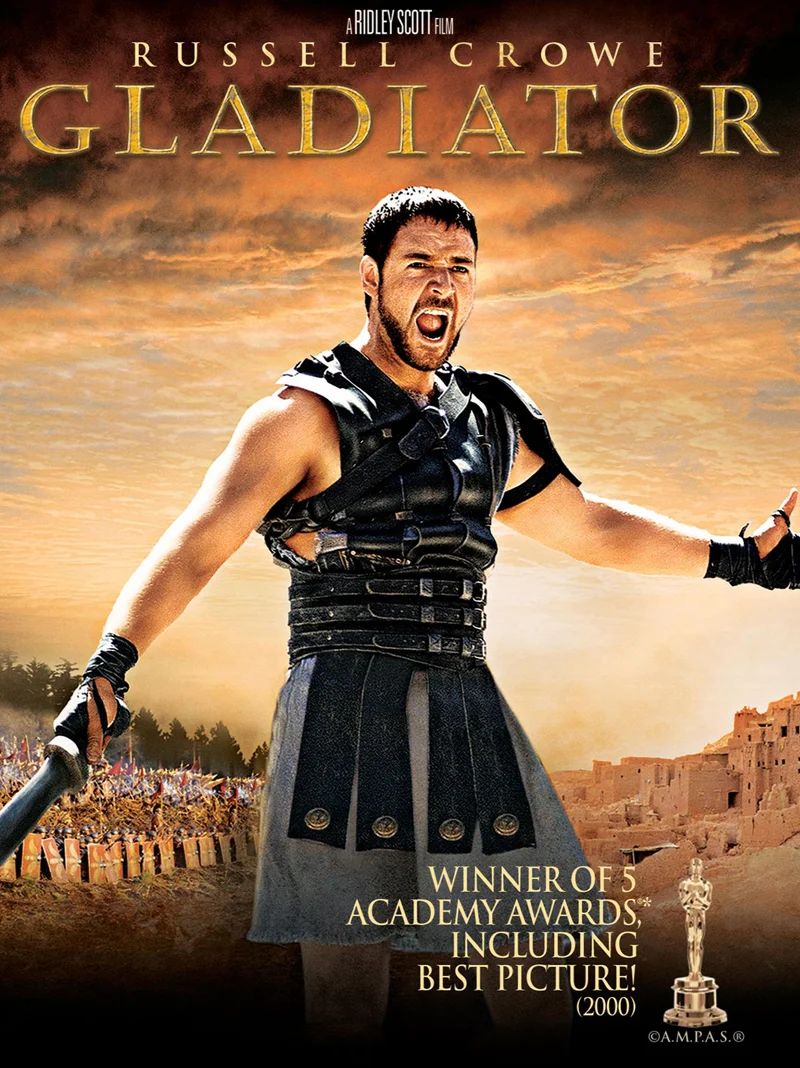 The movie poster looks so fucking stupid. There were certain reasons why I avoided seeing Gladiator
for a long time, and when I finally did, my suspicions were confirmed. The crapfest is Spartacus,
Ben-Hur, and Braveheart all rolled into one. I hate how it's so damn long and pretentious and
lacks the fundamentals of an epic picture. Anyway, Requiem for a Dream should've gotten Best Picture.
The movie poster looks so fucking stupid. There were certain reasons why I avoided seeing Gladiator
for a long time, and when I finally did, my suspicions were confirmed. The crapfest is Spartacus,
Ben-Hur, and Braveheart all rolled into one. I hate how it's so damn long and pretentious and
lacks the fundamentals of an epic picture. Anyway, Requiem for a Dream should've gotten Best Picture.
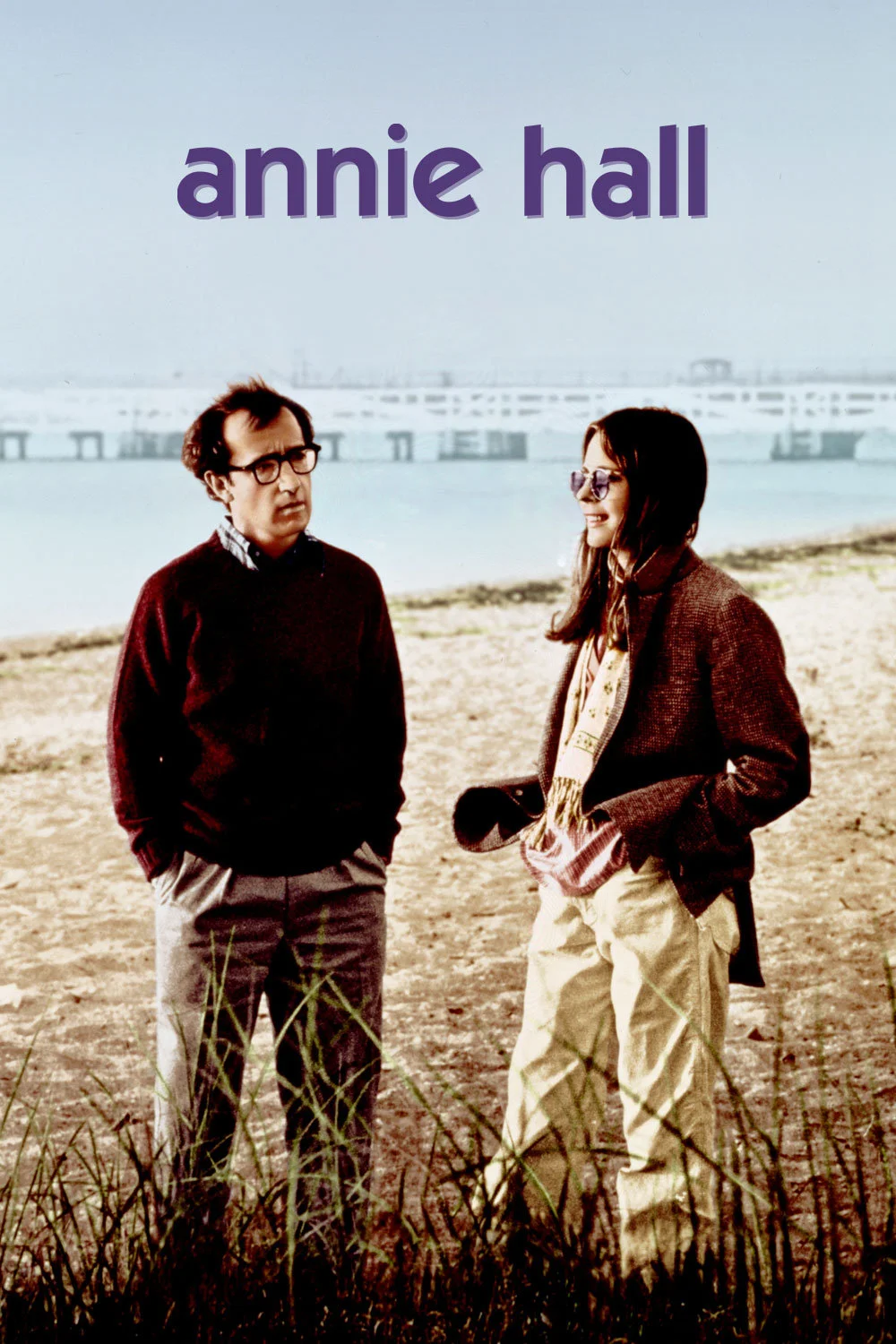 Rocky was a big winner in 1976. The following year, Annie Hall came out and was judged to be in
the same league as the other film. Why, Annie Hall is a heap of junk that involves two self-centered
individuals who won't stop talking about pointless things. Why does somebody think it's funny to make a picture
featuring a male character who's obsessed with death and sex? There's so much dialogue that my mind felt ready
to implode. Anyway, I choose Equus for Best Picture.
Rocky was a big winner in 1976. The following year, Annie Hall came out and was judged to be in
the same league as the other film. Why, Annie Hall is a heap of junk that involves two self-centered
individuals who won't stop talking about pointless things. Why does somebody think it's funny to make a picture
featuring a male character who's obsessed with death and sex? There's so much dialogue that my mind felt ready
to implode. Anyway, I choose Equus for Best Picture.
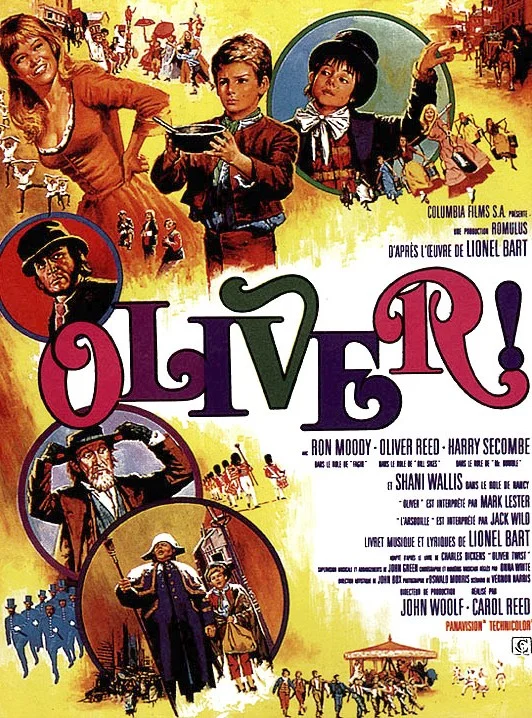 After seeing thousands of films, I still don't get musicals. The idea of mixing dialogues and song numbers is
bewildering. So is the fact that some of the musicals had won Best Picture. In 1968, although it was the last
one to do so until 2003, Oliver! won the most coveted award when 2001: A Space Odyssey (the true
winner), Rosemary's Baby, and Night of the Living Dead weren't nominated.
After seeing thousands of films, I still don't get musicals. The idea of mixing dialogues and song numbers is
bewildering. So is the fact that some of the musicals had won Best Picture. In 1968, although it was the last
one to do so until 2003, Oliver! won the most coveted award when 2001: A Space Odyssey (the true
winner), Rosemary's Baby, and Night of the Living Dead weren't nominated.
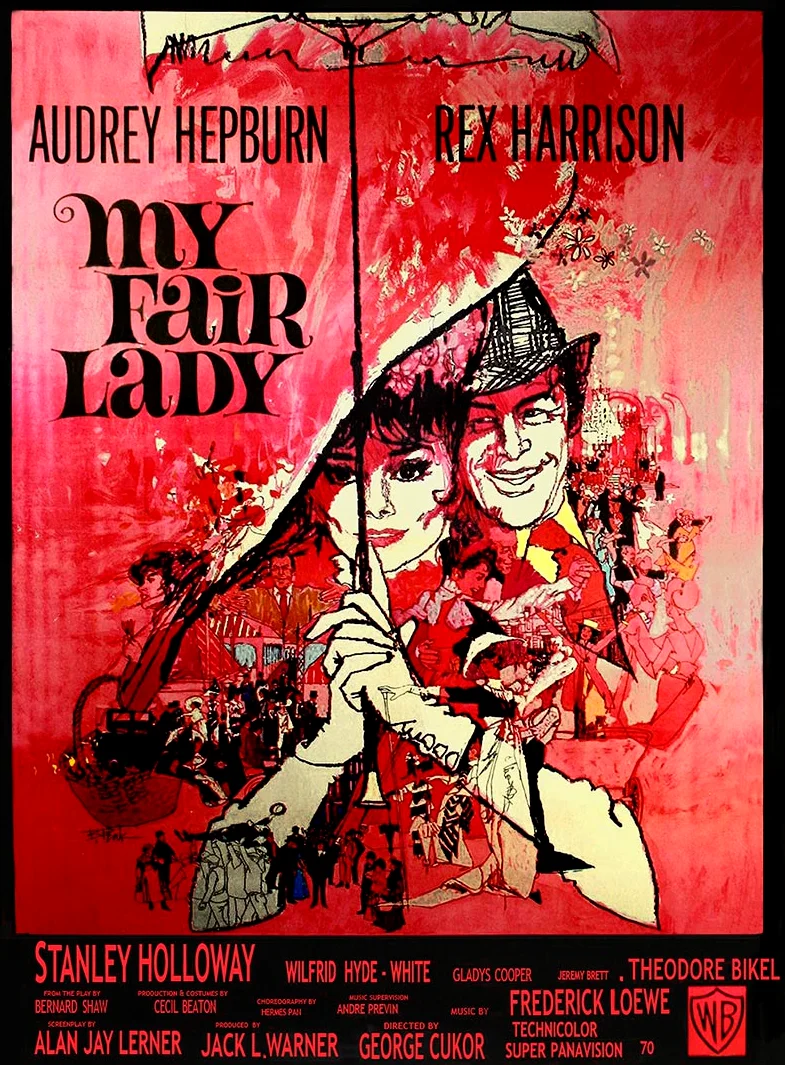 My Fair Lady...the winner of eight Oscars including Best Picture. What the fuck were they thinking in
1964? Truth be told, it was the year of slim pickings. I looked at the contenders, and none of them stood out.
Losing money left and right, the studios tried so hard to protect the Establishment but were washed away by
the imminent wave of independent pictures that finally tore down the Hays Code. So far, my number one choice
is The Train.
My Fair Lady...the winner of eight Oscars including Best Picture. What the fuck were they thinking in
1964? Truth be told, it was the year of slim pickings. I looked at the contenders, and none of them stood out.
Losing money left and right, the studios tried so hard to protect the Establishment but were washed away by
the imminent wave of independent pictures that finally tore down the Hays Code. So far, my number one choice
is The Train.
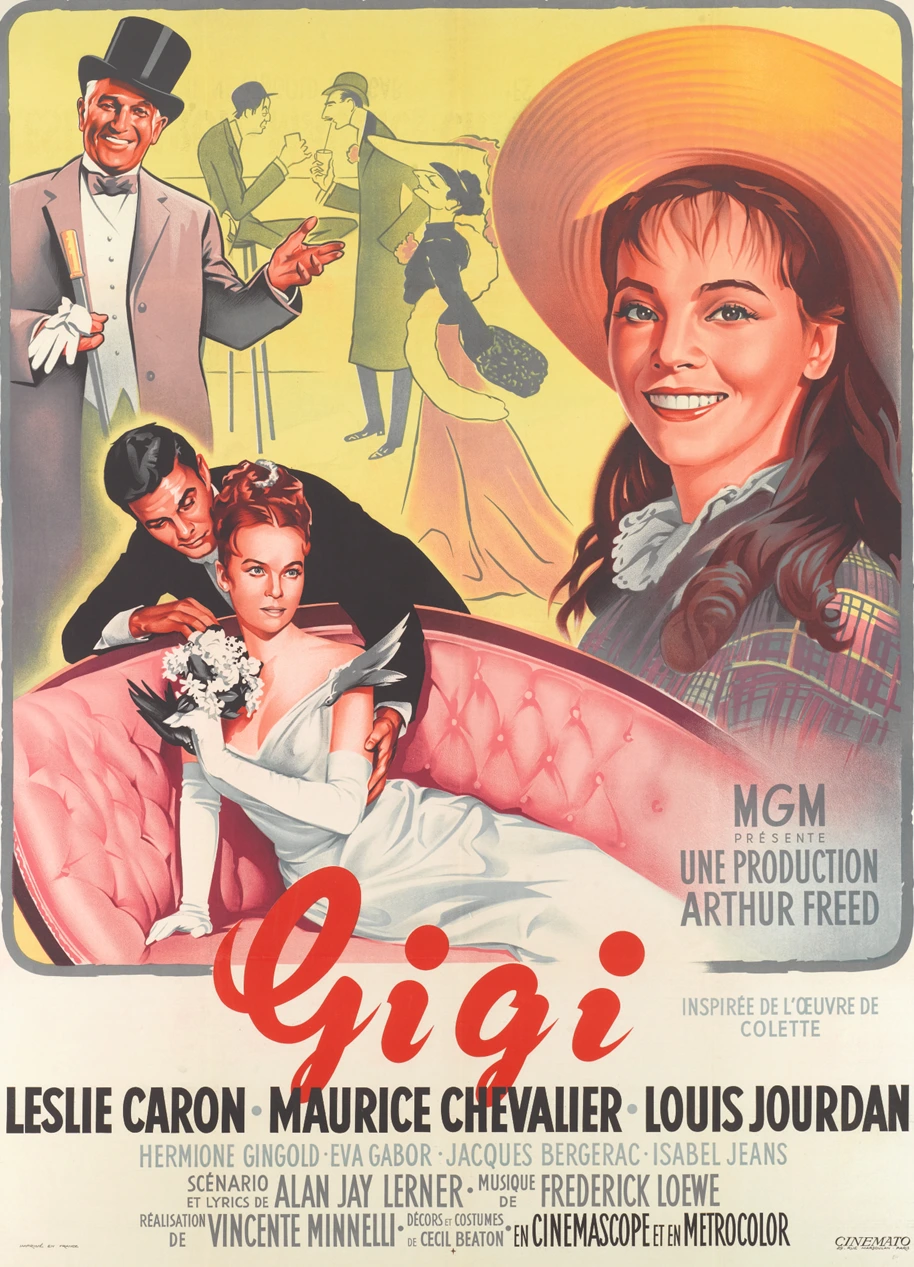 The plot is about a special 14-year-old girl, and she is being groomed as a whore for a significantly older man
who's euphemistically labeled as a "bon vivant"? And the Academy found the whole thing so moving that it bestowed
on the film stupefying nine Oscars? The voters must have been made up of either idiots or old lecherous white
men back then. Therefore, it's hard to believe that Vertigo was completely overlooked for Best Picture.
The plot is about a special 14-year-old girl, and she is being groomed as a whore for a significantly older man
who's euphemistically labeled as a "bon vivant"? And the Academy found the whole thing so moving that it bestowed
on the film stupefying nine Oscars? The voters must have been made up of either idiots or old lecherous white
men back then. Therefore, it's hard to believe that Vertigo was completely overlooked for Best Picture.
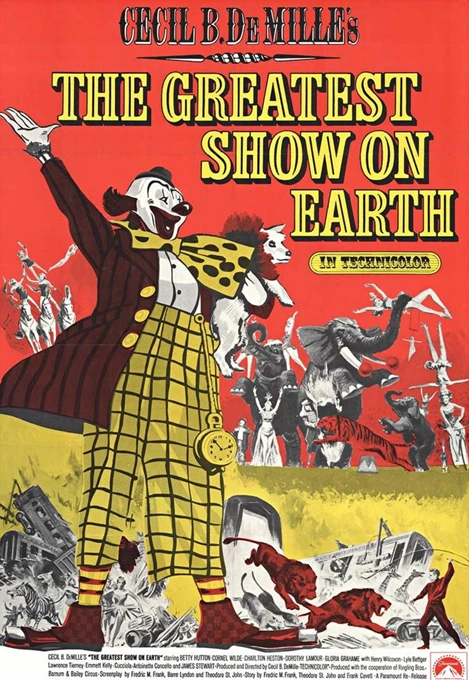 What overblown monstrosity of sheer boredom is this? Best Picture of 1952? Ha! This is
The Worst Show on Earth for 152 agonizing minutes which is akin to throwing all kinds of objects with
different colors into a spinning dryer and hoping for some coherence. Remember the train wreck at the end?
That's the film in a nutshell. Instead, the award should've gone to My Cousin Rachel.
What overblown monstrosity of sheer boredom is this? Best Picture of 1952? Ha! This is
The Worst Show on Earth for 152 agonizing minutes which is akin to throwing all kinds of objects with
different colors into a spinning dryer and hoping for some coherence. Remember the train wreck at the end?
That's the film in a nutshell. Instead, the award should've gone to My Cousin Rachel.
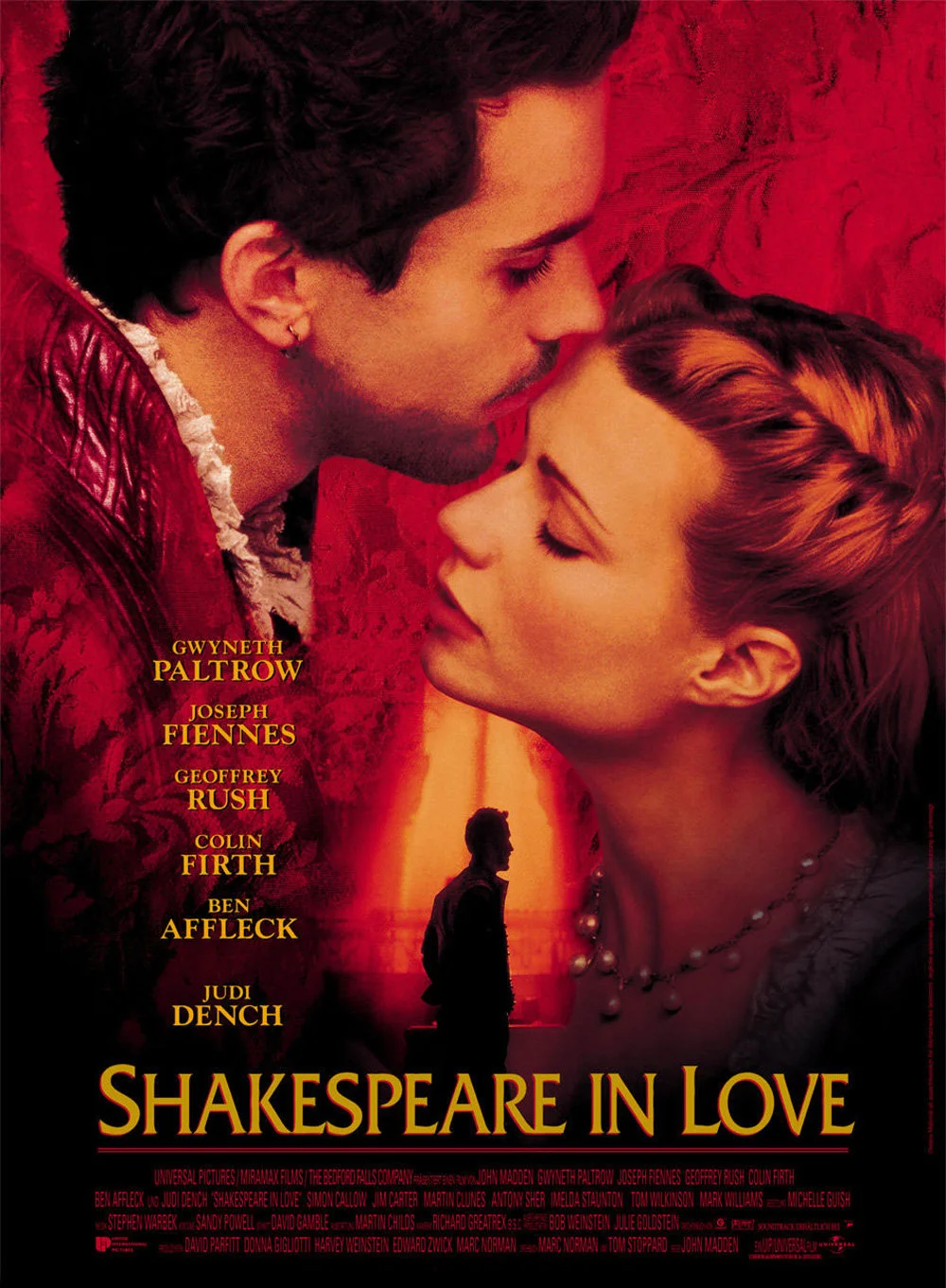 Ah, Virginia, but the story of Shakespeare in Love takes place in 1593 and the colony didn't exist until
1607. Ah, Shakespeare is single and in love with a rich lady, but the real playwright had a wife and three kids.
This is the worst Best Picture winner of all time. It's that bad, ruining the Academy's credibility forever.
The most obvious choice is Saving Private Ryan.
Ah, Virginia, but the story of Shakespeare in Love takes place in 1593 and the colony didn't exist until
1607. Ah, Shakespeare is single and in love with a rich lady, but the real playwright had a wife and three kids.
This is the worst Best Picture winner of all time. It's that bad, ruining the Academy's credibility forever.
The most obvious choice is Saving Private Ryan.